
- About Michelle Waters
- Curriculum Vitae
- Tools I Use
- Podcast Episodes
- How To Be Our Podcast Guest
- Member Login
- Member Helpdesk
- Support Portal
- Resource Partners
- Writing Partners
- Certificate Verification
- How To Contribute
by Michelle Boyd Waters, M.Ed.

A Plethora Of Writing Examples For Middle School (& High School)
October 14, 2014 in Pedagogy

When I started my first job as a professional newspaper reporter (This job also served as an internship during my junior year in college — I just didn’t leave for about 6 years.), I quickly realized that all my experience, and all my years of journalism education had not been enough to help me write stories about drug busts, fatal car accidents and tornadoes. All the theoretical work I’d done, and all of the nifty little scholastic and collegiate stories I had done, did not prepare me for real world writing.
At that point, I had to find a solution quickly. After all, I had a deadline to meet, and it was only a few hours away.
One of my colleagues, who also served as a mentor, had the solution. She introduced me to the newspaper’s “morgue.” This was a room filled with filing cabinets in which we kept old — dead — stories arranged by reporter. Whenever I wasn’t’ sure how to write a story, all I had to do was check the morgue for similar stories. If I needed to write a story about a local drug bust, for example, I’d find another story on a similar incident, study its structure, and mentally create a formula in which to plugin the information I’d gathered.
Once I’d gained more experience, and had internalized the formula for that particular type of story, I felt free to branch out as the situation — and my training — warranted.
I do the same thing when I want to write a type of letter, brochure, or report that I’ve never written before.
This is what writing looks like in the real world.
Of course, if you’re a new teacher like me, there is one problem with providing mentor texts to my students: I have a dearth of middle school level writing sitting around in my file cabinets.
Fortunately, the Internet is full of sources, so I scoured the bowels of Google to find examples. I know how busy you are, so I’m sharing.
Expository writing examples for middle school
Below are several sources of expository writing samples for middle school students.
- The Write Source Expository Writing Samples
- Holt, Rinehart, Winston Expository Essay Models
Finally, here is an article in the New York Times that will help you teach your students real-world expository writing skills .
Descriptive writing examples for middle school
- Descriptive Writing Samples from Novels
- Milwaukee Public Schools Descriptive Essay Samples (p. 137)
- Holt, Rinehart, Winston Descriptive Essay Models
Narrative writing examples for middle school
- Writing Samples by Steve Peha (PDF)
- The Write Source Narrative Writing Samples
- Oregon Department of Education Scored Writing Samples (Ideas and Organization)
- Oregon Department of Education Scored Writing Samples (Sentence Fluency and Conventions)
- Oregon Department of Education Scored Writing Samples (Voice and Word Choice)
- Oregon Department of Education High School Scored Narrative and Argumentative Writing Samples
- Holt, Rinehart, Winston Narrative Essay Models
Argumentative/persuasive writing examples for middle school
- The Write Source Persuasive Writing Samples
- Holt, Rinehart, Winston Persuasive Essay Models
Reflective writing examples for middle school
- Reflective essay examples from Lake Washington Girls Middle School
If you know of any other online writing example sources, please feel free to share them in the comments below.
Related topics: Argumentative Writing , Informative Writing , Mentor Texts , Narrative Writing
About the author
Michelle Boyd Waters, M.Ed.
I am a secondary English Language Arts teacher, a University of Oklahoma student working on my doctorate in Instructional Leadership and Academic Curriculum with an concentration in English Education and co-Editor of the Oklahoma English Journal. I am constantly seeking ways to amplify students' voices and choices.
This is very, very helpful. Thank you for sharing!
As a new middle school teacher (coming from elementary) this was very helpful and encouraging.
Thank you very much for letting me know. I’m glad that I was able to help you!
Thank you! I’m glad I can help.
Your welcome
This is super helpful. Thank you!
These links are a fantastic help. Thank you!
This helped me BUNCHES! Thanks so much!
thanks so much!!!!!!!!!!!!!!!!!!!!!!!!!!!!!!!!!!!!!!!!!!!!!!!!!!!!!!!!!!!!!!!!!!!!!! XD
These links are now dead 🙁
Thank you for notifying me! I have updated the post to include new (live!) links. Some of them are geared towards high school, but I think we can still use them as exemplars of what we want our students to aim for.
Comments are closed.

- Oct 25, 2022
Personal Narrative Writing in Middle School: Digging Deeper
Updated: Oct 25, 2022

For years, I didn't do personal narrative writing in middle school. In fact, I wrote an entire blog post about why I didn't do it . Main reason...it's been done before in many years prior to when those students came to you, especially if teachers prior use writing workshop.
However, I've grown to embrace it again. The biggest reason why is because I think it helps build a classroom community. I decided to go with personal narrative instead of my usual fiction writing in response to reading during the pandemic. I felt, since the kids were remote, this was a good way to get to know each other a little better.
I did peruse Lucy Calkins' Personal Narrative unit for the digital notebook, however, as I went through the unit, I changed a lot.
I like to have the students do a quick narrative based on a person in their lives . The idea of writing about a special moment with a person has been done a lot up until this point so I feel it's an easy way to get a sense of where they are. I have them start with listing moments with an important person. They pick one of those moments to write about.

I don't necessarily need an entire story; I just want them to show me what they can do.
Getting Started
If you don't know already, a personal narrative focuses on a small moment , not an entire day, trip, game, etc. In the earlier grades, teachers spend a lot of time on this (think less watermelon, more seed). At this point, I feel that students just need a refresher.
I like to do this through mentor texts . I provide students with actual written student narratives from my past students. (Here are two you can use. These are by actual students, so definitely not perfect examples. Student Narrative #1 and Student Narrative #2 ).
Students go in to highlight specifically the small moment components of the stories. We discuss how these stories are small moments (or not) and they also start analyzing what the stories did well (or not).
I think it is super valuable to see other students' stories to give students perspective of what's expected or what can be improved.

Brainstorming
Students begin to brainstorm by thinking of a place that is important to them. I tell them to be as specific as possible.
Their idea may be big, but then they make a map of the place. The map is more focused on the moments that happened in the place. They then pick one of those moments in the place and write long about it.

Next, I have students write about moments that mattered. For this, I like to do Show and Tell . I tell students a few days before to bring in an item that is important to them. This should symbolize something or someone that is important in their lives. This goes so well! It goes beyond just what the objects are, but also what they can represent.
They use that object to brainstorm ideas within the topics of "first times", "last times", and "moments I learned something" . For example, I showed a picture of my husband and me at my brother's wedding. This was important to me because it was the first time I had left my son with another babysitter. I was dealing with post-partum anxiety. This stemmed lots of ideas: first time I left my son with a babysitter, first time I had an anxiety attack, the LAST time I had an anxiety attack, the first time I changed a diaper, the moment I learned it's important to enjoy small things, etc.

I start with students focusing on story structure . I have them look at short stories to do this. I really like "Eleven" and "Fish Cheeks". They are short and sweet and are great models for personal narrative.
They fill out the chart for those stories. We discuss, then they plan their own stories on a story structure chart.
The next day we focus on internal and external . This is something we cover in our unit prior. I do a Deep Study of Character before this and we often get into internal and external characteristics of characters. For writing, they focus on what they could be thinking (internal) in each part of their chart and what they could be doing (external) in each part.
Like everything else, we look at short stories first to see how these mentor authors do the same.

Before getting into the actual writing, I spend a day on Show Don't Tell . There are so many things you can do with this, but here's how I do it .
I usually break down each part of the story structure chart by day. So, I will do exposition one day, rising action another, etc. I will start each day with them looking at mentor expositions, etc. Each year, I've done different things. I also share MY PERSONAL NARRATIVE. This is so important; you HAVE to write what the students are expected to write .
A few things I've done:
I would share a Doc with a page or two out of a shared read aloud. I'd give them specific questions that focus on that part of the story map; for example, "how did Jason Reynolds introduce the characters in this chapter?".
I'd have them go back into whatever books they are reading and answer similar questions ("how did the author introduce setting/problem/solution?" "how did the author show feelings/thoughts/actions?").
I always share with them MY exposition, rising action, etc. Sometimes I just read it to them, other times I have them work with partners to look for similar things mentioned in the bullets before this.

It's important to look at mentors. I don't just have them go and write the whole story in a day. It's so important to break it up.
There are so many different lessons you can do. I always have to remind myself that you don't have to teach them EVERY thing. I try to keep revision pretty straightforward.
Of course, there is editing; focusing on grammar, punctuation, spelling. I like to tie in anything I do with mentor sentences or vocabulary . It's a good idea to connect it to anything you do for grammar or word study.
Four major areas of revision as per the Lucy Calkins' unit:
Looking at mentor sentences and trying it out with their own writing.
Finding the heart of the story.
Stretching out scenes (finding a moment that can use more detail and stretching it).
Slowing down the problem scene.

I don't always commit to these exactly. I do like to spend time on dialogue and elaboration . I really get into how important it is to punctuate it properly and how to tag it so it shows more description.
I also revisit their showing and not telling slides and have them apply it to their writing.
One of the very last things I do in the revision stage is have them do critique groups . This is a bit different than just them swapping Docs with each other and commenting. It's more of a dialogue.

Lastly, they finalize their draft and put it on a Padlet . This is used for lots of things. Guardians are able to see their writing. They can see each other's writing. And I have a spot with ALL of their stories.
Bottom Line
While personal narrative has been done, there is always room to grow. I really feel it depends on the group you have. It's a nice way to start the year to get to know each other. I usually spend about a month on the entire unit.
Click below to get my digital notebook for the unit!

************
Want a custom bundle from me click below.

Teachers Pay Teachers Store

Recent Posts
Citing Concise Textual Evidence: Avoiding "Quote Plopping"
Mystery Story Writing: Narratives with a Twist
Spring Things! Fun with Poetry and Figurative Language
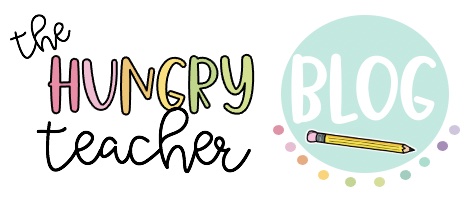
Bell Ringers
Middle school narrative writing made simple.
For the first few years that I taught, I hated teaching narrative writing to my middle schoolers. Writing days meant endless stress. Students were constantly calling my name. There were nonstop problems. Students hardly made progress with their narrative essays because they didn’t know what to do or were waiting on me to help them. It was terrible!
Fast forward to the present day, I look forward to narrative writing in my classroom. Writing days often mean a lot of productivity and a rather calm classroom. So, what has changed to transform my opinion on writing days?
I began using reference sheets! Throughout this blog, I’ll share how reference sheets for narrative writing are the way to a simple, productive middle school writing unit.

What is narrative writing?
Before I dive too deep into reference sheets, I want to make sure we are on the same page with narrative essays. A narrative essay can be fiction or nonfiction . Sometimes narratives are called short stories or personal narratives. Essentially, narratives are stories.
What makes narrative writing so exciting for students is the opportunity to create a detailed story. Whether the story is fiction or nonfiction, the space to add imagery, details, and imagination are huge perks for more creative students.
The downside is that many students can get lost in narratives. For some, the ability for your creativity to run wild can leave them with option paralysis. For others, they are so excited to tell their story that they leave every grammar and language rule behind.
What are reference sheets?
As I spoke about, writing used to be a chaotic experience for me (and my students). I decided I either had to clone myself to help more kids or find a way for the kids to help themselves (and since cloning wasn’t an option…). Enter the reference sheets.
A reference sheet is probably what it sounds like. They are pages of notes that students can reference for information . You can actually snag ALL my narrative writing reference pages in a cute booklet FOR FREE by clicking HERE .

The goal is that students use these reference pages when they are stuck or have questions during writing. Instead of you being the first person they get information from, the reference sheet becomes their guide. Kinda like that three before me rule.
These reference guides can have anything you want in them, but you want to stick to key, need-to-know information. For narrative essays, this might look like dialogue, writing an introduction / body / conclusion, editing, and so forth. The reference page should be easy to find and read through. It can even contain examples for students to reference and model their essay after.
How Reference Sheets Saved my Writing Unit
Before reference sheets, I could easily earn 10,000 steps walking circles around my classroom. I never actually sat down with a student for long to dig deep into their writing. Instead, I was just trying to keep students motivated to write or answer questions like, “Do I put a comma here?”
With reference sheets, my writing routine changed. Here’s what my class now looks like during narrative writing.
- Mini-lesson : I introduce the skill I want students to work on today with their writing. For example, if I want students to add dialogue or edit dialogue in their narrative today, I will provide a mini-lesson on punctuation and placement of dialogue. During the mini-lesson, students will have a reference sheet I made, and we will use it to move through the mini-lesson.
- Example : Next, I will provide some sort of example to my students to model the skill. This example may also be on the reference page I gave them, or it might not. I’ll engage students in the example, and ask them to apply the skill.
- Independent Work : Students are now familiar with their specific skill and task of the day, and they have a go-to guide if they need it. Students are then challenged with working diligently to apply the new skill to their own writing. If they get stuck, they will consult the reference sheet before me.
- Conferences : While independent workers use their reference sheets to edit their writing, certain students will meet with me. Having the majority of the class work independently and not depend on me to answer so many questions frees up time to reteach, clarify, or simply talk to students about their writing. Often I do these in small groups to make use of time.
- Exit Ticket: Lastly, I try to engage students in some type of sharing. They can share something they are proud of, something they wrote, or a question they have.
This type of structure on a writing day would not be possible without my students being able to help themselves and have quick access to information. It’s all thanks to a reference page. Wanna learn more about how I plan my narrative writing units? Check out my other blog post!
If you want to try out reference pages in your own classroom, I have a narrative writing reference booklet ready with all the essential information your students will need. . It will save you time and sanity on your writing days. You can check out that resource here. It includes skills such as plot, details, transitions, dialogue, and much more.

I hope you try out reference pages of your own to see the magic happen in your classroom! If you aren’t sure where to start, try the writing day schedule I wrote about above. You can tweak it for your own students.
- Read more about: Middle School Writing
You might also like...
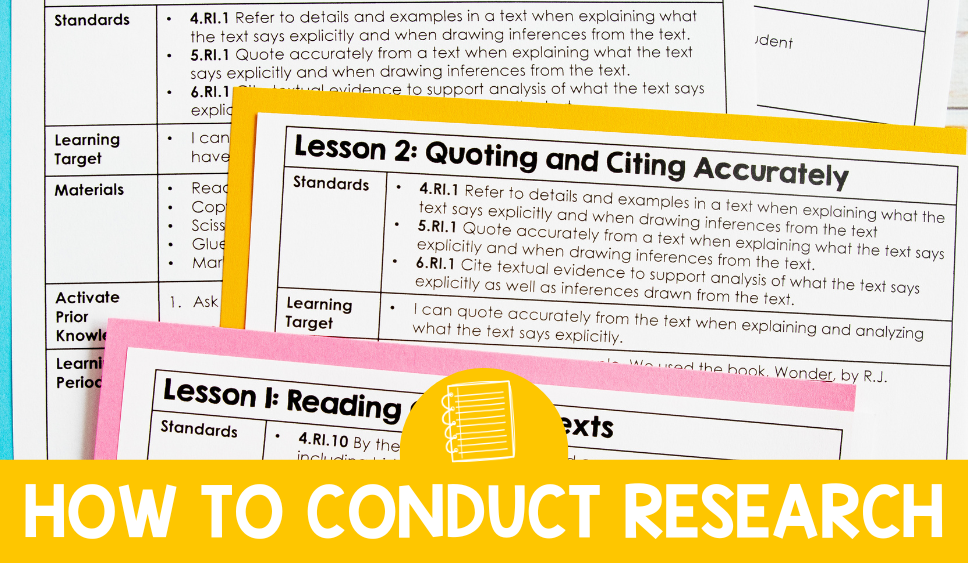
Teach Students How to Effectively Conduct Research
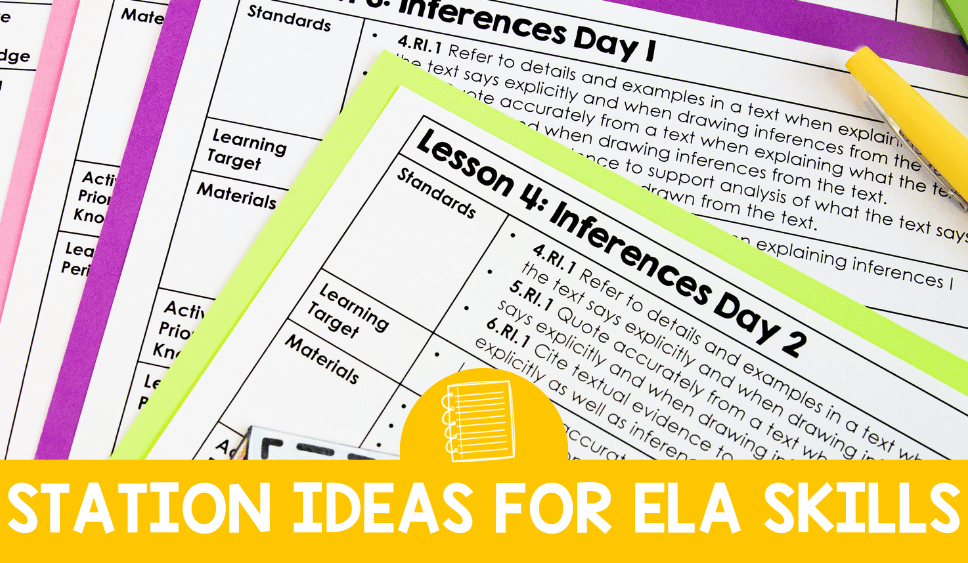
4 Station Ideas for Middle School ELA Skills
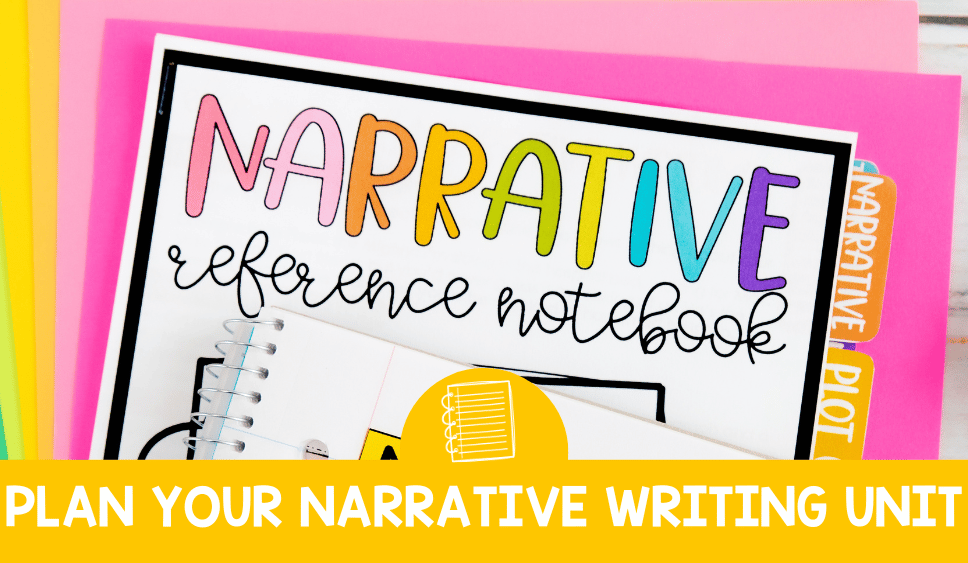
How to Plan Your Narrative Writing Unit
Get your free middle school ela pacing guides with completed scopes and sequences for the school year..
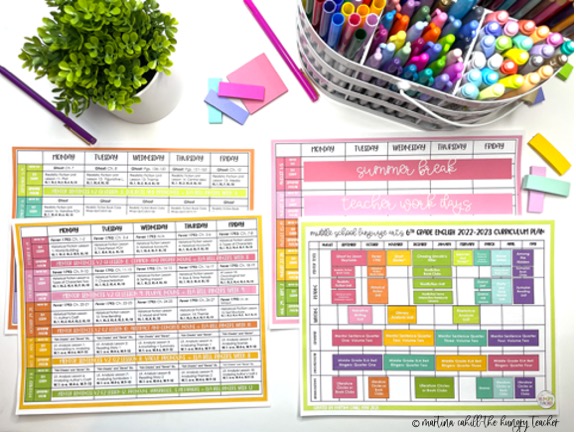
My ELA scope and sequence guides break down every single middle school ELA standard and concept for reading, writing, and language in 6th, 7th, and 8th grade. Use the guides and resources exactly as is or as inspiration for you own!
Meet Martina
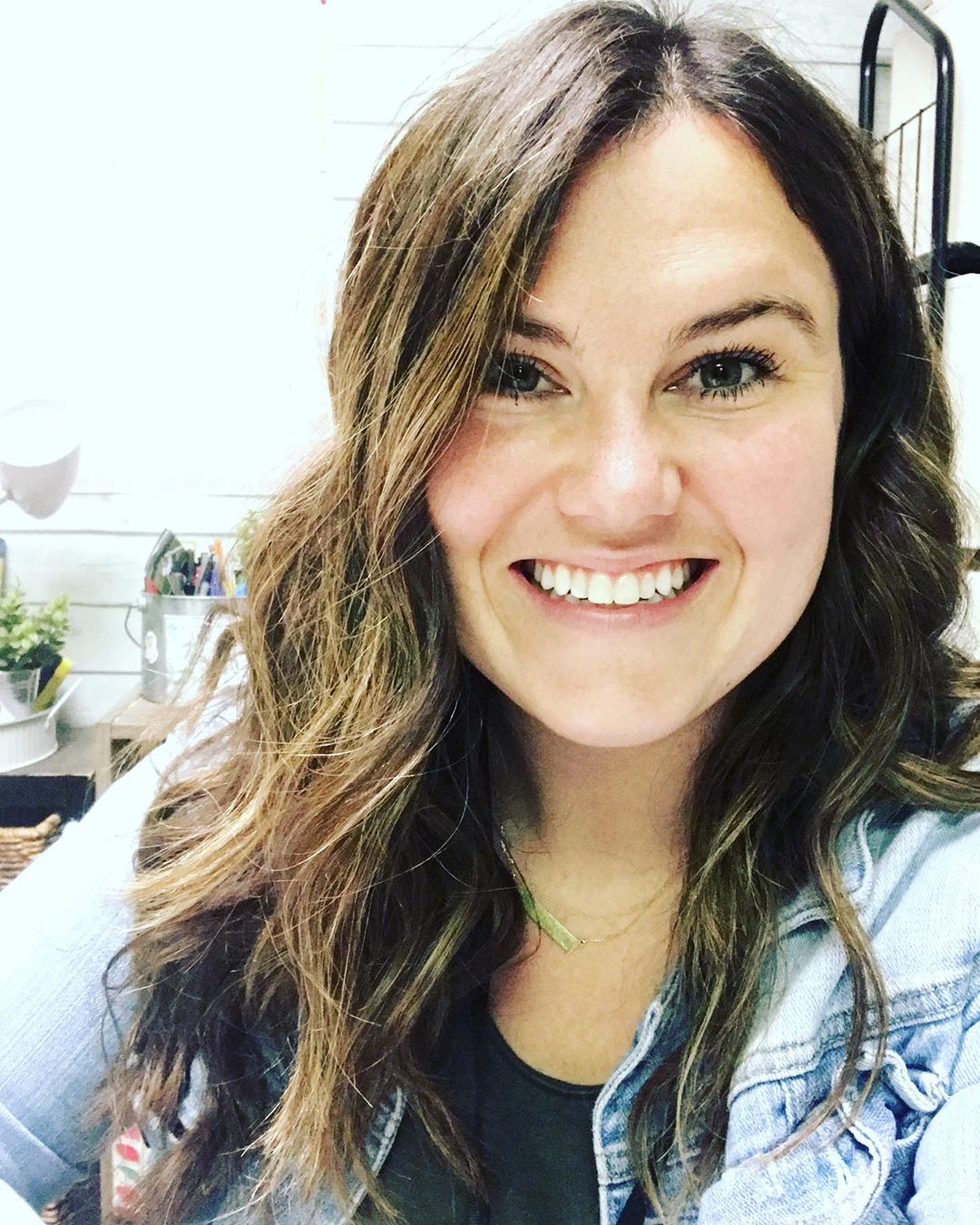
I’m a Middle School ELA teacher committed to helping you improve your teaching & implement systems that help you get everything done during the school day!
Let's Connect
Member login.
PRIVACY POLICY
TERMS OF USE
WEBSITE DISCLAIMERS
MEMBERSHIP AGREEEMENT
© The Hungry Teacher • Website by KristenDoyle.co • Contact Martina
Home — Essay Types — Personal Narrative Essay
Personal Narrative Essay Examples
In the realm of personal narrative essays, personal narrative essay examples serve as a compelling platform for individuals to share their unique stories, experiences, and perspectives. These essays are more than just pieces of personal history; they are windows into the human condition. However, a key factor in crafting a memorable personal narrative essay lies in selecting the right topic. In this article, we'll delve into the art of choosing personal narrative essay topics and explore their significance in creating a meaningful and engaging narrative.
Finding Ideas for a Personal Narrative Essay
The first step in the journey of crafting a captivating personal narrative essay is finding ideas and inspiration. Inspiration often resides within our own lives and experiences:
- Reflecting on Personal Experiences: Personal narrative essays draw their strength from real-life encounters and observations. Take time to reflect on moments that have left a lasting impact on you.
- Exploring Emotions and Memories: Emotions are the lifeblood of personal narratives. Recall events that stirred powerful emotions within you, whether it was joy, fear, anger, or love.
- Identifying Life-Changing Moments: Sometimes, our most profound stories revolve around events that changed the course of our lives. Identify these turning points and consider how they have shaped you.
By utilizing these ideas for a personal narrative essay, you will unlock a wealth of storytelling potential. Reflecting on personal experiences , exploring emotions and memories, and identifying life-changing moments will enable you to tap into the richness of your own life.
Popular Personal Narrative Essay Ideas and Topics
Now, let's explore some popular personal narrative essay ideas that encompass a wide range of experiences and emotions:
Childhood Memories
- First Day of School : Delve into the nerves, excitement, and anticipation of your very first day of school. What did it teach you about resilience and adaptability?
- A Memorable Family Vacation: Share the details of a family vacation that etched memories into your heart. What made it unforgettable, and how did it shape your bond with your family?
- A Childhood Friendship: Reflect on a cherished childhood friendship. Explore the lessons you learned about trust, loyalty, and the bittersweet passage of time.
Life-changing Experiences
- Overcoming a Fear or Phobia: Narrate an experience where you conquered a deep-seated fear or phobia. What steps did you take, and what did it reveal about your inner strength?
- A Pivotal Life Decision: Share the story of a critical decision that altered the course of your life. What factors weighed on your choice, and what did you gain or lose?
- An Unexpected Adventure: Recount an unexpected adventure that took you out of your comfort zone. What challenges did you face, and how did you grow as a person?
Personal Growth and Reflection
- A Lesson Learned from a Mistake: Explore a mistake you made and the valuable lesson it taught you. How did this experience shape your decision-making and personal growth?
- Achieving a Personal Goal: Celebrate the journey of achieving a personal goal. Reflect on the obstacles you overcame and the determination that fueled your success.
- A Moment of Self-Discovery: Share a moment when you discovered something profound about yourself. How did this newfound self-awareness impact your life and relationships?
Tips for Choosing the Right Topic
When it comes to selecting topics for personal narratives, making the right choice is essential to craft a compelling and meaningful story. Your chosen topic forms the foundation of your narrative, shaping its tone, relevance, and impact on your readers. Selecting the right personal narrative essay topics is crucial. Here are some tips to guide your choice:
- Connecting with Your Audience: Consider your target audience and choose a topic that will resonate with them. Your narrative should evoke emotions and experiences that your readers can relate to.
- The Importance of Authenticity: Authenticity is the key to a compelling personal narrative. Choose a topic that genuinely reflects your experiences and emotions. Readers can sense when a story is authentic.
- Balancing Significance and Relatability: While dramatic events make for engaging narratives, even seemingly small moments can hold immense significance. Balance the significance of the event with its relatability to your audience.
In the realm of personal narrative essays, the choice of topic serves as the foundation upon which the narrative is built. It determines whether your story will resonate with readers and leave a lasting impression. Personal narrative essay examples can illustrate how a well-chosen topic can make your narrative more engaging and relatable. As we conclude this exploration of personal narrative essay topics, remember that your life is a treasure trove of stories waiting to be shared. Whether it's a childhood memory, a life-changing experience, or a moment of self-discovery, the power of your narrative lies in your ability to choose the right topic and let your unique voice shine through. So, embrace your experiences, and embark on a journey of storytelling that captivates, inspires, and connects with others.
Embark on a journey through this writing guide, where personal narrative examples aren’t merely presented; they leap off the page, enveloping us in a world where stories don’t just speak—they roar, resonate, and sometimes, perform a whimsical dance. In this realm, personal narrative examples serve as our guideposts, illuminating the path to crafting narratives that are as authentic as they are compelling.
What is a Personal Narrative Essay Examples
A personal narrative essay is a type of essay that tells a story from the author’s own life experiences and perspectives. It is a form of creative nonfiction in which the author shares a personal story, event, or incident that holds meaning or significance. Personal narrative essays often aim to engage the reader by providing a vivid and emotional account of the author’s experiences.
When crafting a personal narrative essay, it’s essential to find valuable personal narrative essay examples to guide you. This type of writing demands a unique approach, where external research is unnecessary. Draw from your personal experiences and explore your ideas from a personal point of view. The purpose of such essays is to let you work on a certain topic by using analysis and by turning to reflective writing practices.
The examples of personal narrative essays may relate to anything from bullying to the way social media affects our perception of body image in a negative way. Likewise, if you are majoring in Journalism or Political Sciences, you may take any topic that would relate to what you are currently exploring unless you have already been provided with an essay prompt. In either case, you must take your time to focus on your opinion and things that inspire you the most. If you can keep your writing interesting and unique, it will always show as you write.
Personal narrative essays are a popular form of writing that allow individuals to share their personal experiences, stories, and insights. In the infographics we’ve prepared, you can find a most common types of personal narrative essays:
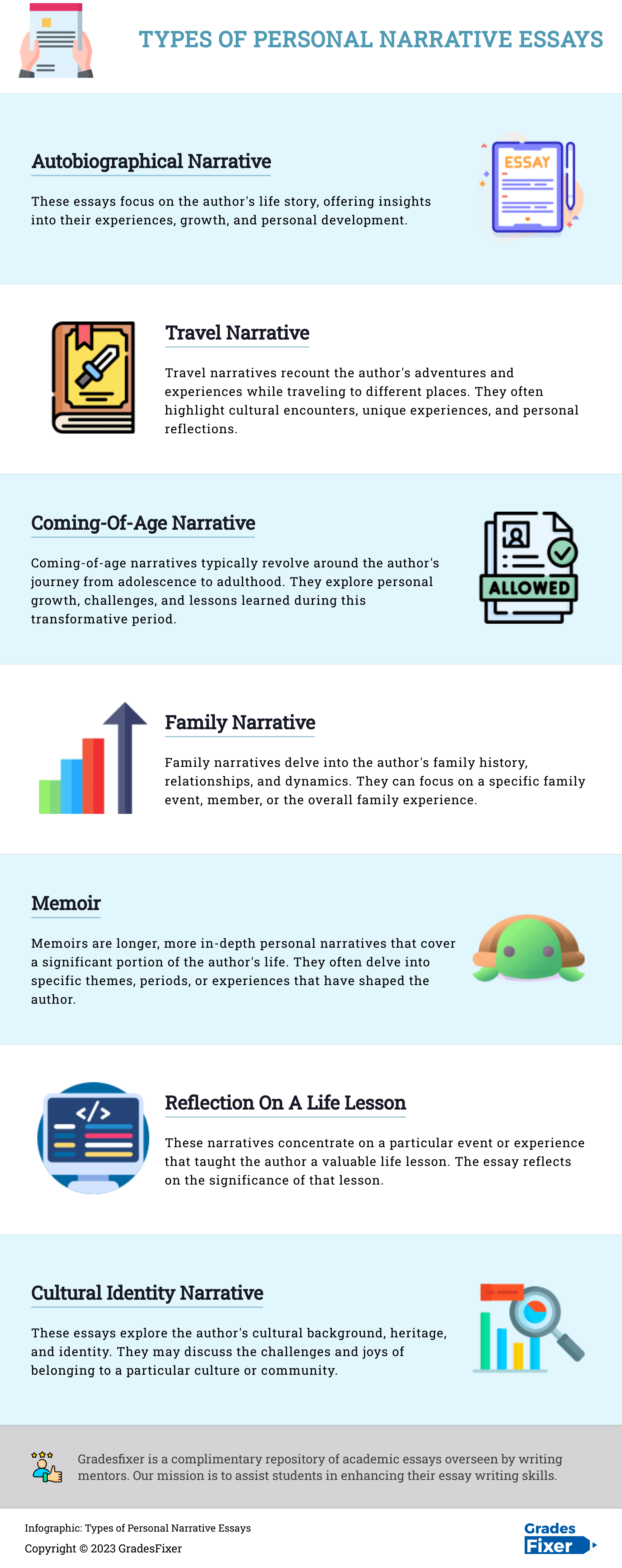
These are some of the most common types of personal narrative essays, each with its unique focus and storytelling approach. The choice of type depends on the author’s personal experiences and the message they want to convey.
How to Write a Personal Narrative Essay
Writing a personal narrative essay is a creative and introspective process that enables you to share a piece of your life with others. If you’re wondering how to write a personal narrative essay, here are 5 key steps to help you get started:
- Choose a Meaningful Experience : Select a personal experience that has had a significant impact on your life. Whether it’s a moment of growth, a life-changing event, or a cherished memory, pick a topic that resonates with you.
- Plan Your Narrative : Create an outline to organize your thoughts. Highlight the main events or moments you want to include and decide on the order in which you’ll present them. This will provide structure to your essay.
- Engage Your Audience : Craft a captivating introduction that immediately grabs the reader’s attention. You can use vivid descriptions, a compelling question, or a thought-provoking quote. Establish the setting and context to draw the reader into your story.
- Tell Your Story : In the body of your essay, narrate your story chronologically. Describe the events, emotions, and thoughts you experienced. Utilize descriptive language to create a vivid picture for the reader, immersing them in your narrative.
- Reflect and Conclude : Conclude your essay by reflecting on the significance of the experience. Share what you’ve learned, how it has affected you, and the message or insight you want to leave with your reader. Summarize the key points to make a lasting impression.
Writing a personal narrative essay allows you to share your unique experiences and connect with your audience on a personal level. By carefully selecting your topic, crafting a compelling narrative, and reflecting on its importance, you can create an impactful and memorable essay. If you’re looking for an example of a personal narrative essay , studying well-crafted essays can provide valuable insights into the structure and storytelling techniques that make them effective.
Incorporating these steps into your writing process will help you craft a compelling and meaningful personal narrative essay that resonates with your audience.
Writing a Personal Narrative Essay: Tips and Tricks
Writing a personal narrative is an art form that invites readers into your world, offering them a glimpse of your experiences, emotions, and reflections. Whether you’re crafting a personal narrative essay for a class, a publication, or your satisfaction, the following tips and tricks, illustrated with personal narrative essay examples, can help you create a compelling and resonant story.
- Start with a Strong Hook. Engage your readers from the very beginning with a captivating hook. This could be a thought-provoking question, a surprising fact, or a vivid scene. For example, a personal narrative example might begin with a dramatic moment that immediately places the reader in the heart of the story.
- Focus on a Significant Moment. A personal narrative should center around a significant moment or series of events that had a profound impact on you. This doesn’t have to be a life-altering event, but it should be meaningful enough to warrant exploration. Personal narrative essay examples often highlight a turning point that offers insight into the writer’s growth or change.
- Include Sensory Details. Bring your story to life with sensory details. Describe what you saw, heard, smelled, touched, and tasted to help the reader experience the event as you did. A personal narrative essay example might describe the aroma of a grandmother’s kitchen or the texture of a rough sea to immerse the reader fully.
- Explore Your Emotions and Reflections. The heart of a personal narrative lies in your introspection and emotional journey. Discuss how the events affected you, what you learned, and how you changed. Personal narrative essay examples excel when they delve deep into the writer’s emotional landscape, offering honest and relatable reflections.
- Use Dialogue Effectively . Incorporating dialogue can add dynamism to your narrative, bringing characters to life and moving the story forward. Ensure that the dialogue sounds natural and contributes to the development of the story or the understanding of the characters. A well-chosen dialogue in a personal narrative example can illustrate a relationship or a pivotal moment vividly.
- Structure Your Narrative with Care. While a personal narrative may not follow a traditional plot structure, having a clear beginning, middle, and end is crucial. Lead your readers through the events with a purposeful narrative arc, guiding them toward the resolution or the main point of your story. Personal narrative examples show how an effectively structured narrative can enhance the impact of the story.
- Revise and Edit. A great personal narrative doesn’t just happen on the first draft. Revise your work for clarity, coherence, and conciseness. Pay attention to grammar and punctuation, and consider feedback from readers to refine your narrative. Personal narrative essay examples that resonate the most are often those that have been carefully polished.
- Reflect on the Universality of Your Experience . While a personal narrative is inherently personal, reflecting on the universal themes within your story can connect with a broader audience. Consider how your personal experiences touch on larger truths or common human experiences. A personal narrative essay that captures universal themes becomes relatable and impactful.
By following these tips and tricks and studying personal narrative essay examples, you can craft a personal narrative that not only tells your story but also touches the hearts and minds of your readers. Remember, a personal narrative is a gift of your perspective, a glimpse into your world that can enlighten, entertain, and inspire.
How to Structure a Personal Narrative Essay: Examples
Turning to personal narrative structure , you are mostly allowed to approach a free style where you may keep your narration according to your preferences, yet it’s recommended to keep your topics narrowed down to a certain period of time or a take on things if that speaks of your life’s experience. To create an engaging and well-structured personal narrative essay , follow these essential elements:
- Introduction : Set the Stage
- Start with a hook: Begin your essay with an attention-grabbing sentence or anecdote that draws readers in.
- Provide context: Introduce the setting, time, and place of your story.
- Present the thesis statement: Clearly state the main idea or message you want to convey through your narrative.
- Background Information : Build the Foundation
- Offer background details: Provide essential information about the characters, setting, and circumstances relevant to your story.
- Develop characters: Describe the key individuals involved, including yourself, if applicable.
- Plot Development : Unfold the Story
- Sequence events: Organize the events of your narrative in chronological order to maintain clarity.
- Build tension: Use rising action to create anticipation and interest in the narrative.
- Climax: Present the turning point or the most significant moment of your story.
- Descriptive Detail s: Paint a Vivid Picture
- Utilize sensory imagery: Engage readers’ senses by describing sights, sounds, smells, tastes, and feelings.
- Use vivid language: Employ descriptive adjectives and metaphors to enhance the reader’s understanding of your experiences.
- Reflection and Analysis : Share Insights
- Reflect on the significance: Explain why the experience was meaningful or how it impacted you.
- Offer personal insights: Share your thoughts, emotions, and personal growth resulting from the experience.
- Conclusion : Wrap It Up
- Summarize the story: Provide a concise summary of the main events and their outcomes.
- Reinforce the thesis: Reiterate the key message or lesson learned.
- End with a powerful closing: Leave readers with a thought-provoking statement, a lesson, or a reflection.
- Editing and Proofreading : Polish Your Essay
- Revise for clarity: Ensure the narrative flows smoothly and is easy to follow.
- Check for grammar and spelling errors: Use tools like Grammarly to eliminate mistakes.
- Seek feedback: Have someone else review your essay for constructive input.
- Title : Choose an Engaging Title
- Craft a title that captures the essence of your narrative and intrigues potential readers.
Remember, personal narrative essays allow you to share your unique experiences and perspectives, making them compelling and relatable to your audience. By following this structured approach, you can create a well-crafted and engaging personal narrative essay.
How to Start a Personal Narrative Essay
Starting a personal narrative essay can be both exciting and challenging. To help you embark on this writing journey effectively, here are 5 key points on how to start a personal narrative essay :
P1. Choose an Engaging Topic: Begin by selecting a compelling and personal experience as your essay’s focus. Reflect on moments from your life that had an impact, taught you a lesson, or evoked strong emotions. Your chosen topic should resonate with both you and your potential readers.
P2. Create a Captivating Hook: Grab your readers’ attention right from the start. You can use a catchy anecdote, a thought-provoking question, a relevant quote, or a vivid description to engage your audience. The hook sets the tone for your narrative.
P3. Develop a Clear Thesis Statement: In a personal narrative essay, your thesis statement should convey the central message or lesson you want to share through your story. It serves as a roadmap for your essay, guiding both you and your readers throughout the narrative.
P4. Organize Your Ideas: Outline the main events and details you want to include in your essay. Ensure a logical flow of events, from the introduction to the climax and resolution. Organizing your thoughts beforehand will make the writing process smoother.
P5. Show, Don’t Just Tell: Use descriptive language and vivid imagery to paint a picture for your readers. Let them experience the emotions and sensations you felt during the event. Showcasing your experiences through sensory details helps create a more immersive narrative.
By following these 5 key points on how to start a personal narrative essay , you can begin your essay-writing journey with confidence and captivate your readers from the very beginning.
Personal Narrative Examples to Inspire Your Writing
A personal narrative essay example , such as this personal narrative essay example about life , is a written piece that serves as an illustration or personal narrative essay sample. It is a real-life essay that an author has written to share a personal experience or story, often in the first-person perspective.
Free personal narrative essay examples are used to demonstrate how to structure and craft a personal narrative essay, showcase effective storytelling techniques, and provide inspiration and guidance to other writers who may be working on their own personal narratives. They are valuable resources for both students and writers looking to understand the art of personal storytelling and how to effectively convey their own experiences through essays.
Good Personal Narrative Essay Samples
Good examples of personal narratives serve as effective tools for enhancing your comprehension. Here are some excellently crafted narrative essay examples. Take the time to thoroughly analyze them and leverage their guidance to create a well-written essay of your own.
Short Free Personal Narrative Essay Examples
Dive into these brief yet impactful stories for inspiration and insights into crafting your own compelling personal narratives.
Examples of Personal Narrative Essays for College
These narratives delve into diverse experiences, offering valuable insights and storytelling inspiration for those navigating the world of higher education. Dive into these narratives to discover the power of personal storytelling in a college context.
Personal Narrative Essay Examples for High School
These narratives are tailored to resonate with high school students, providing a valuable glimpse into personal experiences, challenges, and moments of growth.
Checklist for Writing a Personal Narrative Essay
While it is considered that no thesis statement is necessary for a personal narrative essay, you should keep your main thought throughout as you deal with a certain topic. See our free personal narrative essay examples and brainstorm various ideas before you start. Don’t forget to check our helpful checklist to make sure that you follow the general structure rules for this essay:
- You write in the first person.
- Your tone is narrative and explanatory where and if necessary.
- You keep up with the same idea and avoid vague statements.
- You have a strong hook or some fact in your introduction.
- You bring out a moral lesson in your conclusion part.
- There are transitions and topic sentences at the beginning of each paragraph. ( Use words like “Therefore”, “As a result of”)
Although it’s a personal narrative, make sure that you choose your topic wisely by exploring the objectives and checking your grading rubric twice!
Exploring the Essence of Personal Narrative Examples
Diving into today’s exploration, we’ve encountered the enchanting essence of personal narratives. Far from mere storytelling, these narratives act as vibrant conduits for conveying messages, rendering abstract ideas tangible, and forging authentic human connections. Whether deployed in a polished professional presentation, a candid conversation, or the draft of your latest writing endeavor, the strategic integration of a well-crafted story can significantly amplify your message.
Navigating the art of personal storytelling requires a balanced approach—aim for authenticity without veering into the realm of TMI (Too Much Information), and strive to captivate without tipping into melodrama. The arenas for employing these personal narratives are boundless. Whether in formal professional environments or spontaneous casual interactions, a memorable story can leave a lasting impression, elevating you in the minds of your audience.
The Joy of the Catch: A Personal Narrative on Fishing
Fishing is often regarded as a serene pastime, a chance to connect with nature and escape the hustle and bustle of everyday life. However, for me, catching my first fish was more than just a leisure activity; it was a transformative experience that instilled in…
The Echoes of Loss: A Personal Narrative on Anna Garcia’s Death
Introduction The death of a loved one is a profound and transformative experience, often leaving an indelible mark on those who remain. The passing of Anna Garcia, a cherished friend, and confidante, was a moment that significantly altered the course of my life. Her untimely…
Reflections on a Golden Summer: My Childhood Story
Introduction Childhood is often regarded as a golden period in one’s life, a time when the world is full of possibilities and each day brings new adventures. Reflecting on my own childhood, I am transported back to a summer that was filled with joy, innocence,…
Personal Narrative Drivers Ed
Learning to drive is often seen as a rite of passage for many teenagers. It represents newfound freedom, independence, and an essential step towards adulthood. This essay explores the personal journey of acquiring driving skills through a Drivers Education (Drivers Ed) program, reflecting on the…
Get professional help in 5 minutes

From Familiar Shores to New Horizons: My Journey to Shanghai
Introduction Moving to a new city, especially one as dynamic and culturally rich as Shanghai, is an experience that can shape one’s life in profound ways. This essay recounts my personal narrative of relocating from my hometown to Shanghai, a move that encompassed a blend…
Envisioning My Dream House: A Personal Narrative
Introduction Dreams often serve as the canvas upon which our deepest desires and aspirations are painted. Among these dreams, the vision of a dream house holds a special place, encapsulating not only the essence of comfort and luxury but also the embodiment of one’s personal…
Echoes in the Deep: My Encounter with the Humpback Whale
Introduction The allure of the ocean has always been a powerful force, a vast, uncharted territory that beckons the curious and the adventurous. Among its many wonders, the humpback whale stands out as a symbol of nature’s majesty and mystery. My personal encounter with a…
The Transformative Experience of a Camping Trip
Introduction Personal narratives serve as a powerful tool to reflect on individual experiences and derive meaning from them. Engaging in a camping trip offers a unique platform for such reflections, blending the serenity of nature with the challenges of outdoor living. This essay delves into…
Personal Narrative Paper: My Dream Car
Introduction Throughout my life, the concept of a “dream car” has evolved alongside my personal growth and changing tastes. As a child, I was fascinated by the flashy colors and sleek designs of sports cars, inspired by television shows and toy collections. In my teenage…
Embracing Another Opportunity: A Journey of Resilience and Growth
Introduction Opportunities often come in the most unexpected forms, sometimes disguised as setbacks or challenges. The ability to recognize and seize these moments can significantly alter the trajectory of one’s life. This essay delves into a personal narrative that encapsulates the essence of embracing another…
What is a personal narrative essay?
In most cases, you must take ideas that deal with a personal narrative that can be a story from your life or a case that you have been involved in. You should write from the first person. Personal narrative examples include writing about your birthday or meeting your best friend in middle school. The topics should inspire you and have a beginning with a hook sentence, content, and a conclusion.
How to write personal narrative essays?
Regardless of what subject you may write about, most personal narrative essays should include an argumentation or a lesson. Ask yourself about what can your audience learn when reading your story. It may be a little difficult to write at first, yet start with a brief introduction, thesis, and a story itself with a powerful conclusion. See our free personal narrative essay to see how it can be done right.
What is the purpose of a personal narrative essay?
The primary purpose is to share a personal experience or story, allowing readers to connect with the author on a deeper level. It may also convey a lesson, moral, or reflection.
How do I choose a topic for my personal narrative essay?
Select a topic that holds personal significance, such as a life-changing event, memorable journey, or lesson learned. Choose something that resonates with you.
What makes a personal narrative essay compelling?
Vivid descriptions, sensory details, and emotional connections make a personal narrative essay compelling. Show, don't just tell the story.
Can I write a humorous personal narrative essay?
Absolutely! Personal narrative essays can be humorous, serious, or a mix of both, depending on the tone you want to convey.
How do I conclude a personal narrative essay effectively?
Summarize the main events, reiterate the central message or lesson, and end with a thought-provoking statement or reflection.
What is the recommended word count for a personal narrative essay?
The word count can vary, but a typical personal narrative essay may range from 500 to 1,500 words. It's best to follow the guidelines provided by your instructor or publication if applicable.
The most popular topics for Personal Narrative Essay
- Personal Experience
- Helping Others
- Cultural Diversity
- Cultural Identity
- Engineering
Students also browse
- Profile Essay
- Problem Solution Essay
- Exploratory Essay
- Satire Essay
- Research Essay
- Memoir Essay
- Autobiography Essays
- Synthesis Essay
- Informative Essay
- Evaluation Essay
We use cookies to personalyze your web-site experience. By continuing we’ll assume you board with our cookie policy .
- Instructions Followed To The Letter
- Deadlines Met At Every Stage
- Unique And Plagiarism Free
- Grades 6-12
- School Leaders
Get 50% off your first box of Home Chef! 🥙
65 Engaging Personal Narrative Ideas for Kids and Teens
Tell a story to engage the reader.
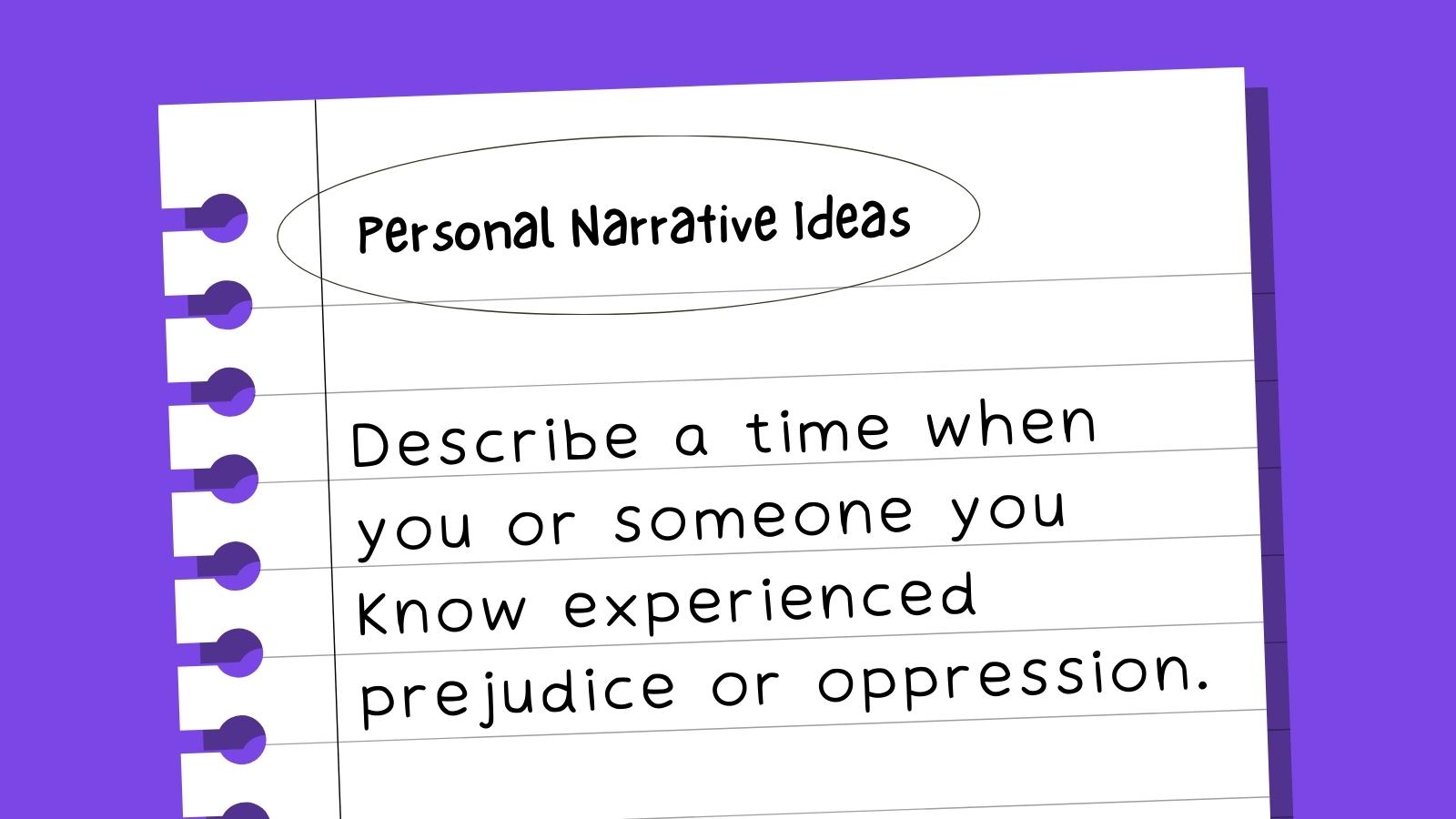
Personal narrative essays are all about telling stories. Engage your reader with lots of descriptive language, and ensure you have a beginning, middle, and end. ( Get more tips about teaching narrative writing here. ) Try these personal narrative ideas to inspire kids and teens to tell meaningful stories from their own lives, no matter what they’ve experienced.
“Describe a Time When You …” Personal Narrative Ideas
Firsts and bests personal narrative ideas, general personal narrative essay ideas, college essay personal narrative ideas.
These personal narrative ideas urge students to dig into their past experiences and share them with their audience. Be sure to share the details, including what took place and how it made you feel, and anything you learned from the experience.
Describe a time when you:
- Were scared
- Overcame a big challenge
- Learned an important life lesson
- Had to make a difficult decision
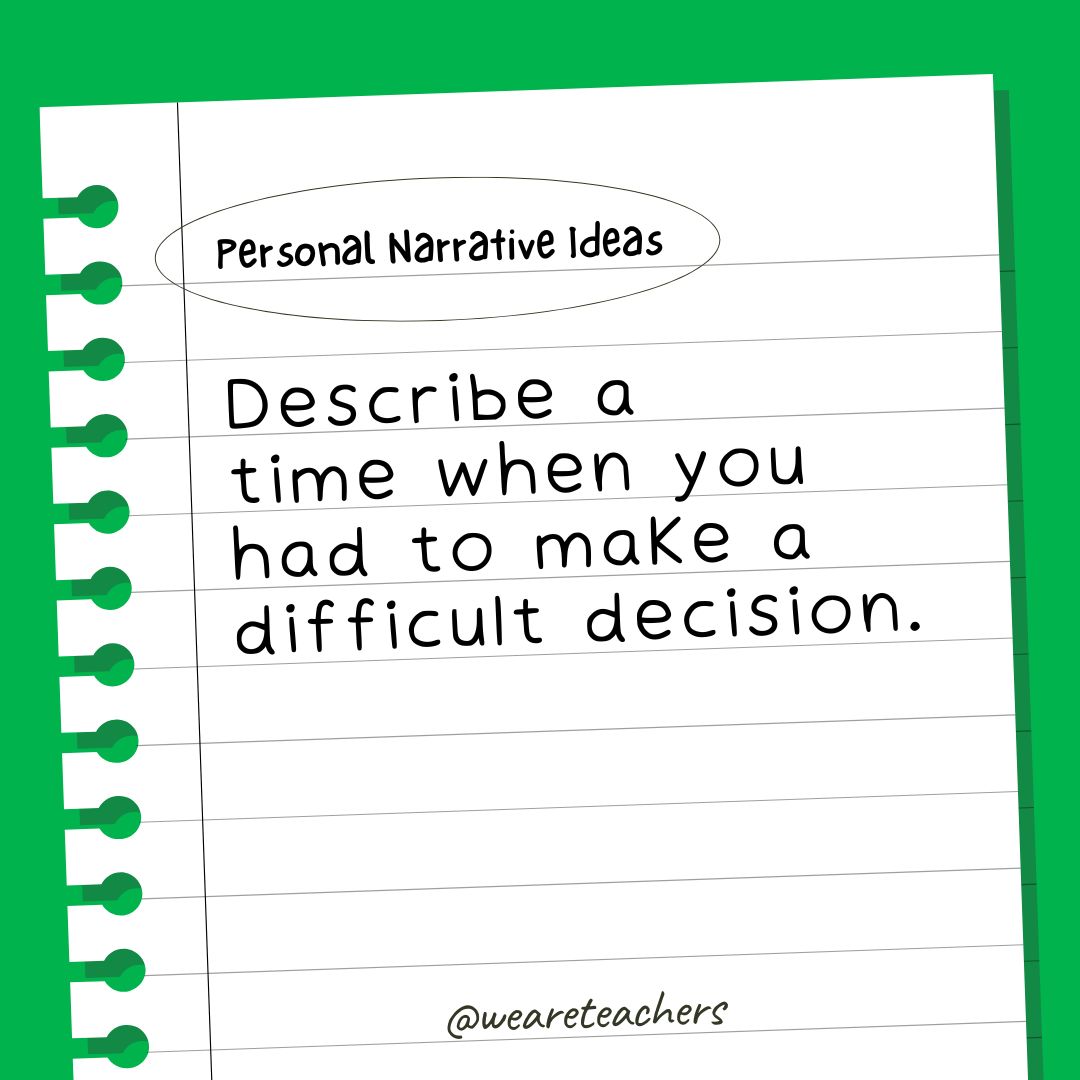
- Were proud of a friend or family member
- Did something you didn’t want to and ended up liking it
- Met a celebrity or someone you really admire
- Tried something new
- Made a mistake and had to apologize and/or fix the mistake
- Were in danger
- Helped someone in need
- Had a dream come true
- Felt inspired
- Had a really terrible day
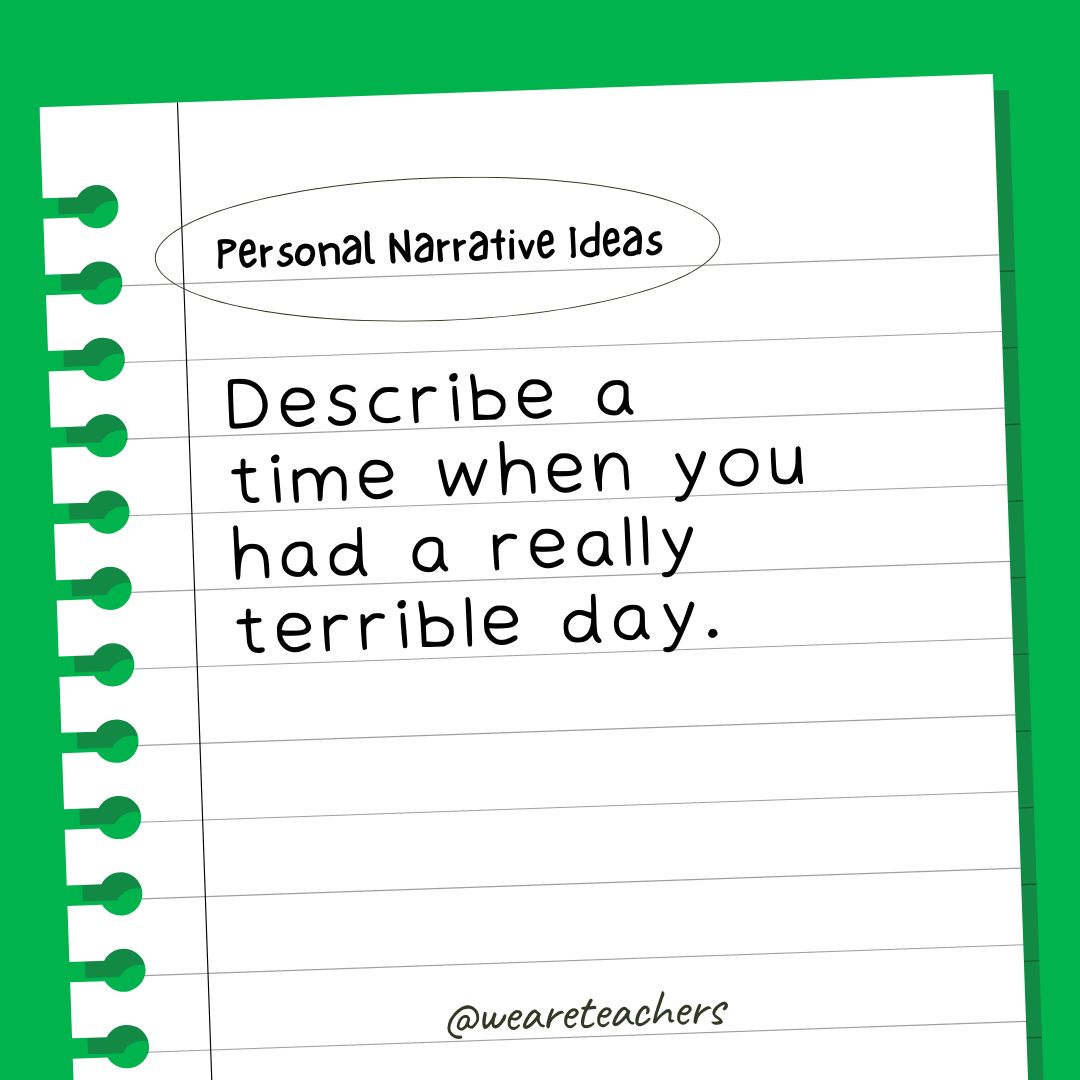
- Were a leader
- Made someone else laugh
- Did something you later regretted
- Set a goal and achieved it
These essay topics explore the times you did something for the first time ever, or when you were the best version of yourself.
- Write about meeting your best friend for the first time and how your relationship developed.
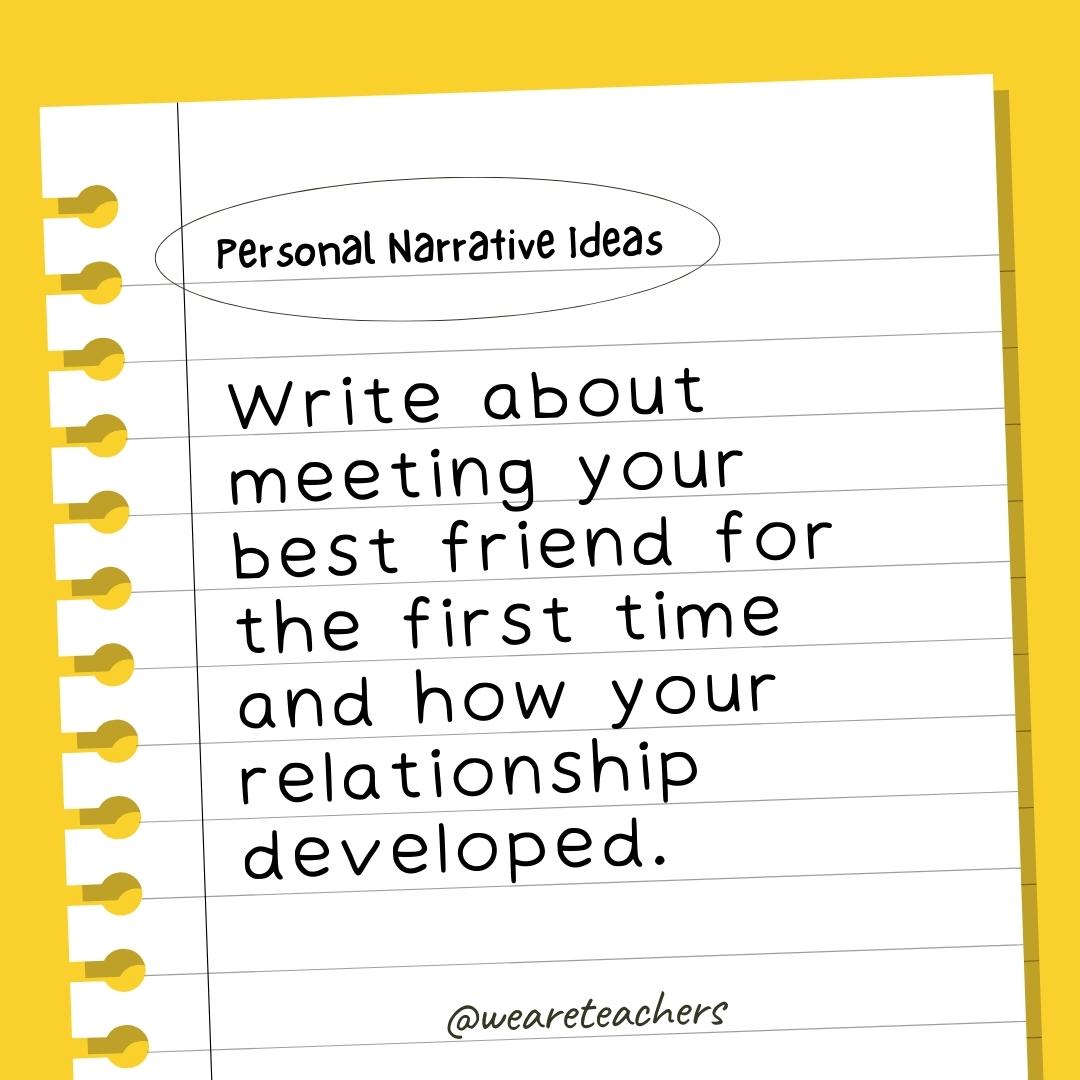
- Tell about learning to ride a bike or drive a car.
- Tell about your proudest moment.
- What is your happiest memory?
- What is your earliest memory?
- Explain what it’s like to move to a new town or start a new school.
- What’s the best (or worst!) vacation you’ve ever taken?
- Tell the story of the time you got your first pet.
- Describe your favorite field trip of all time.
- Tell the story of your first day of kindergarten.
- What’s the best meal you’ve ever eaten?
- Describe the best party or celebration you’ve ever attended.
- Tell about the first time someone ever paid you for work (first job, chores for a neighbor, babysitting, etc.) and how it made you feel.
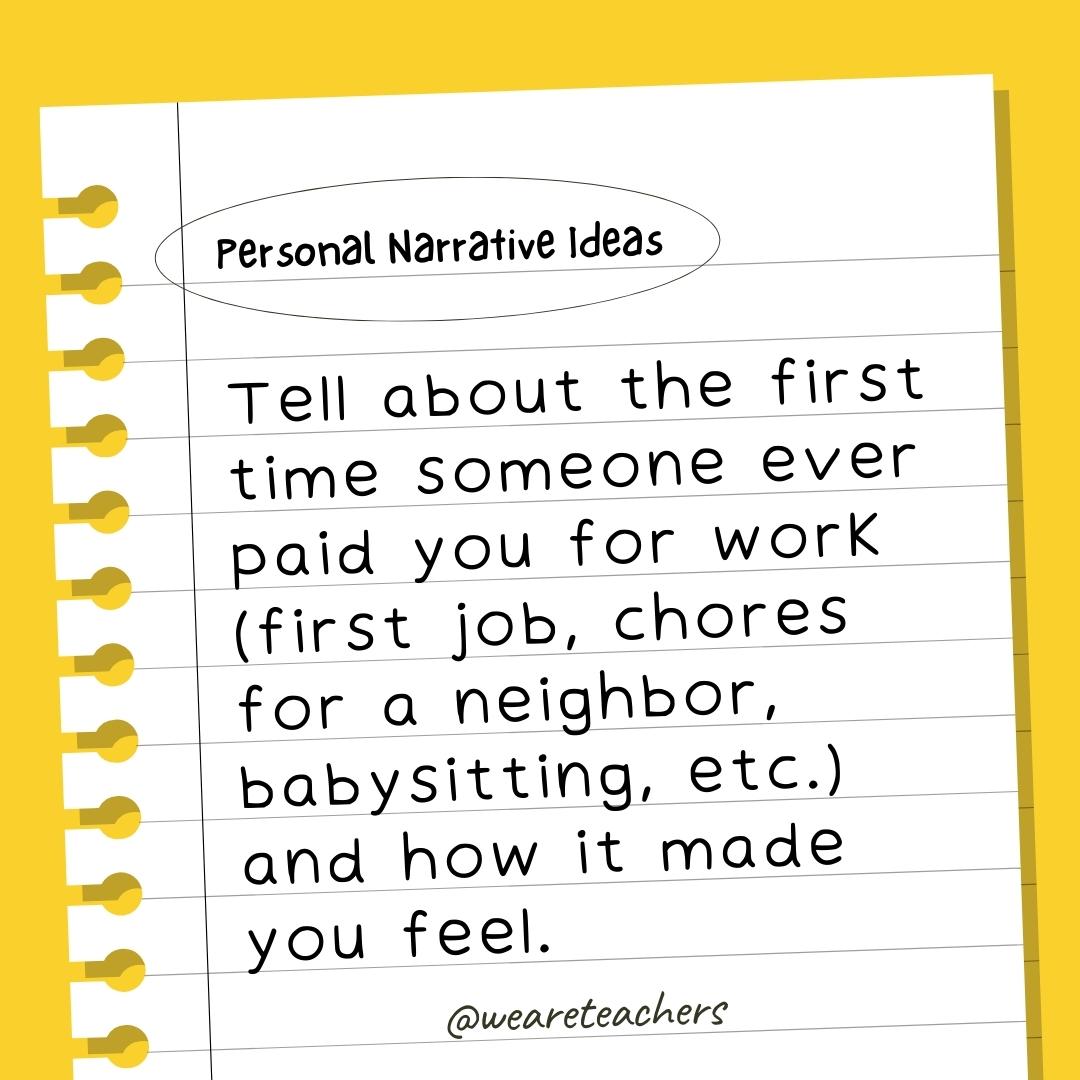
- Describe the first time you spent a night away from home without your family.
- What’s the best gift you’ve ever been given?
Here are more personal narrative topics to inspire young writers.
- Describe a performance or sporting event you took part in.
- Explain the process of cooking and eating your favorite meal.
- Write about a time when you or someone you know displayed courage.
- Share the most embarrassing thing that ever happened to you.
- Describe a time when you or someone you know experienced prejudice or oppression.

- Explain a family tradition, how it developed, and its importance today.
- What is your favorite holiday? How does your family celebrate it?
- Describe your morning routine from the time you wake up until the moment the school bell rings to start the day.
- Share what you do on a typical non-school day.
- Tell about a time when you were injured. How did it happen?
- Describe an argument you and a friend had and how you resolved it.
- Tell about what you think your life will be like when you’re 25 years old.
- Explore a time when you felt you were treated unfairly.
- What makes your family different from everyone else’s family?
- If you could relive any day in your life, what would it be? Would you want it to be the same or different?
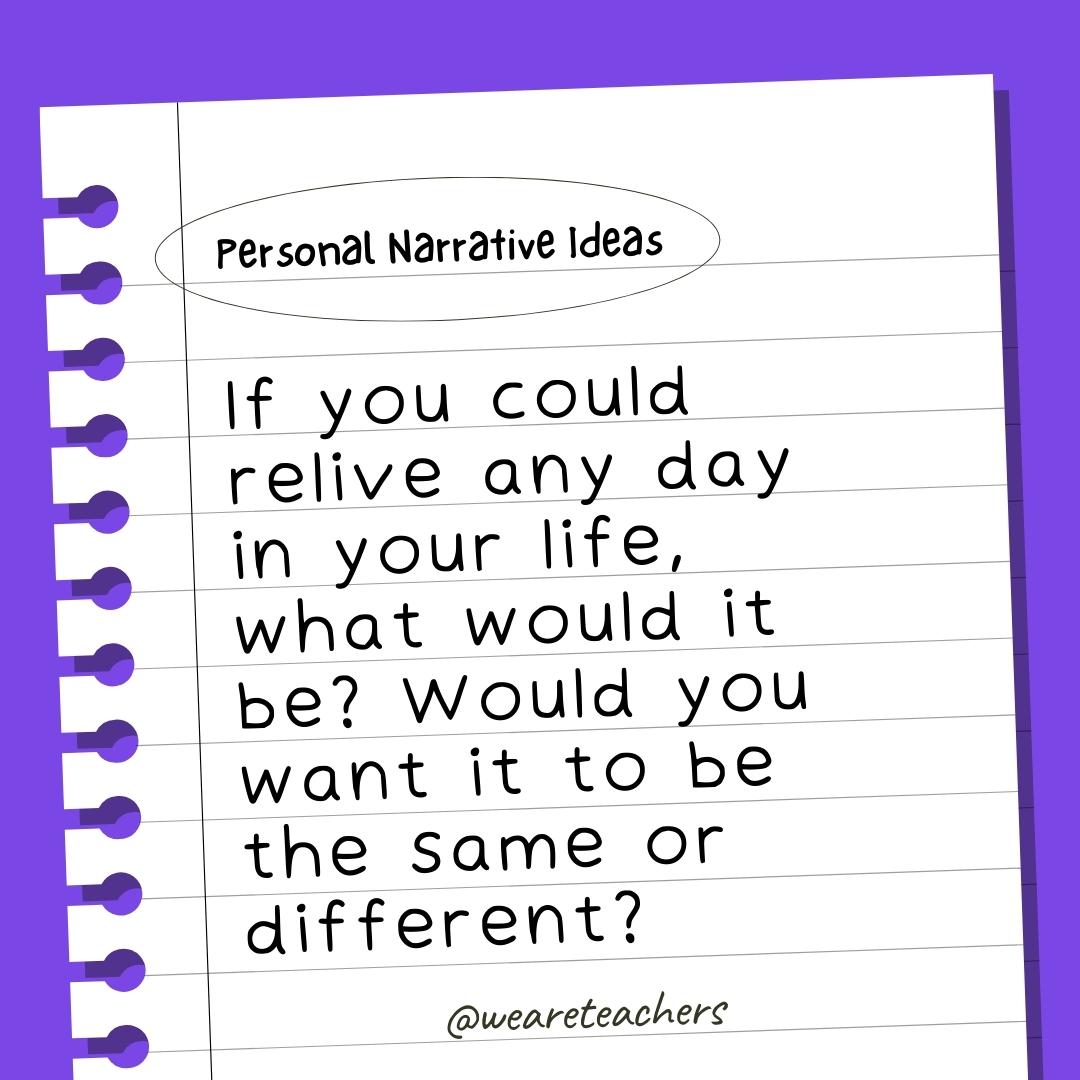
These personal narrative essay topics all come from real 2022–2023 college applications. ( See more college essay prompts here. )
- Discuss a time when reflection or introspection led to clarity or understanding of an issue that is important to you.
- Share an example of how you have used your own critical-thinking skills on a specific subject, project, idea, or interest.
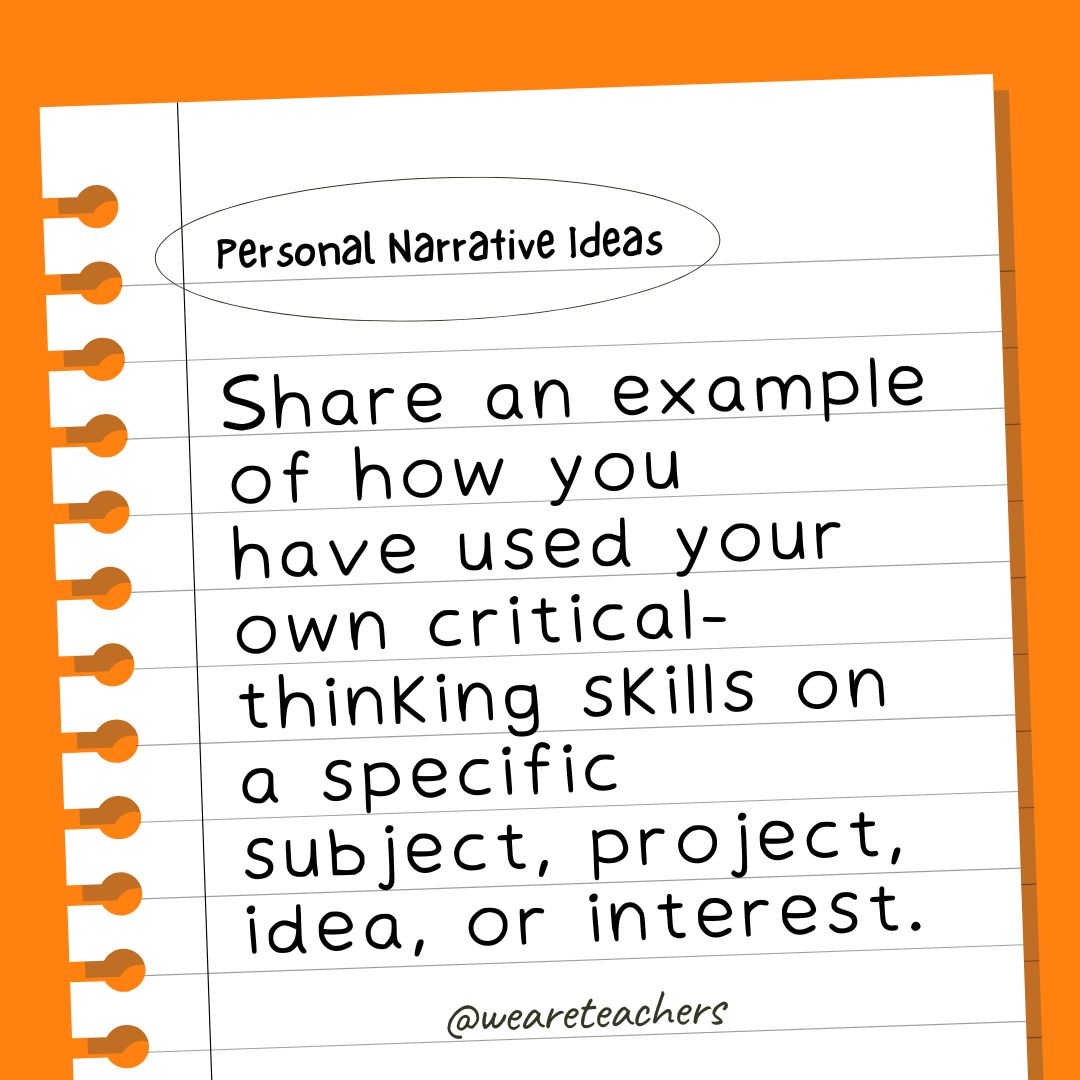
- Using your personal, academic, or volunteer/work experiences, describe the topics or issues that you care about and why they are important to you.
- Reflect on a personal experience where you intentionally expanded your cultural awareness.
- When was the last time you questioned something you had thought to be true?
- Reflect on a time when you or someone you observed had to make a choice about whether to act with integrity and honesty.
- Describe an example of your leadership experience in which you have positively influenced others, helped resolve disputes, or contributed to group efforts over time.
- Describe a time when you were challenged by a perspective that differed from your own. How did you respond?
- Elaborate on an activity or experience you have had that made an impact on a community that is important to you.
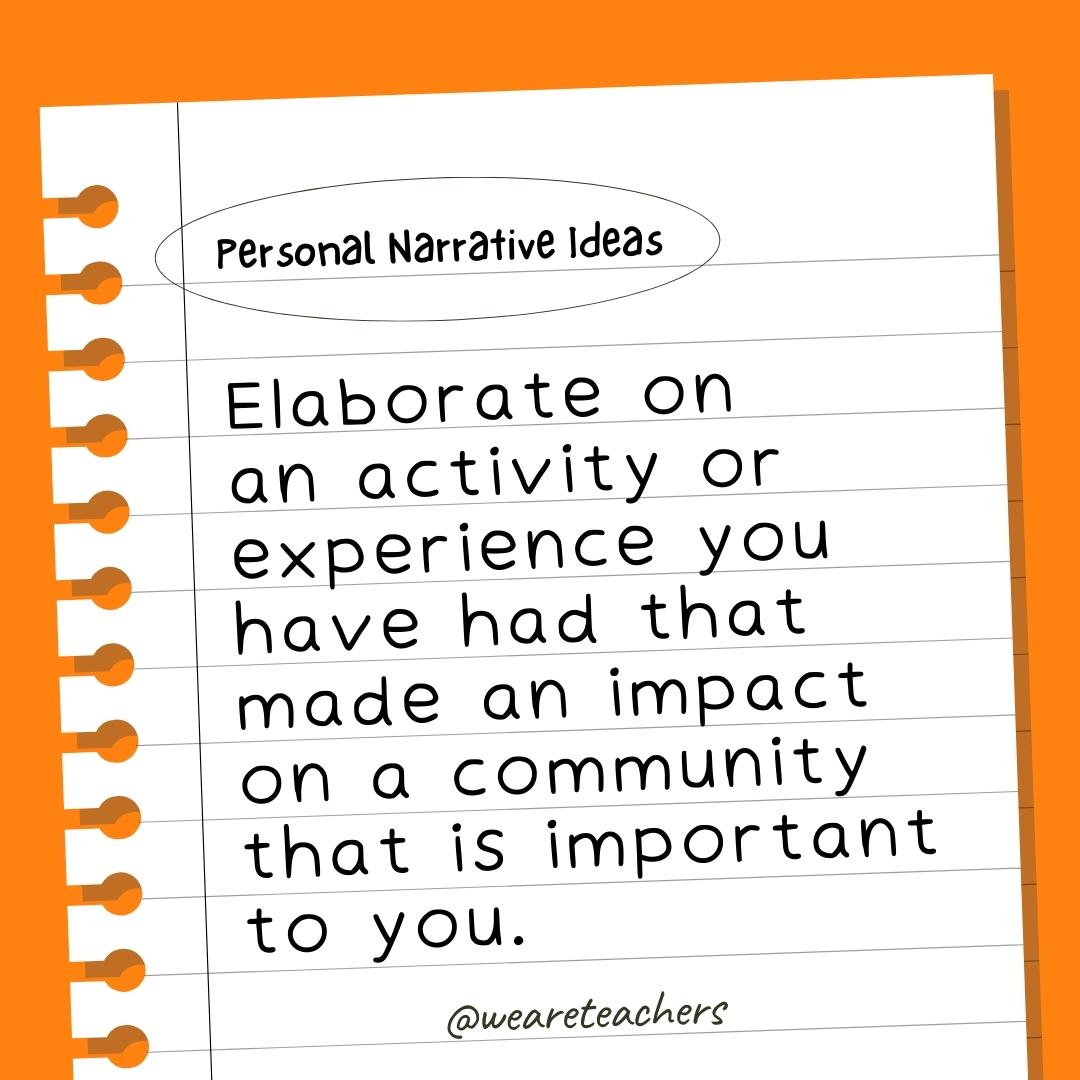
- Describe any meaningful travel experiences you’ve had.
- Choose one of the communities to which you belong, and describe that community and your place within it.
- What is the greatest compliment you have ever been given? Why was it meaningful to you?
- What has been your best academic experience in the last two years, and what made it so good?
- Describe a time when you’ve felt empowered or represented by an educator.
- Describe how you have taken advantage of a significant educational opportunity or worked to overcome an educational barrier you have faced.
What are your favorite personal narrative ideas? Come share on the WeAreTeachers HELPLINE group on Facebook.
Plus, check out the big list of essay topics for high school (100+ ideas) ., you might also like.
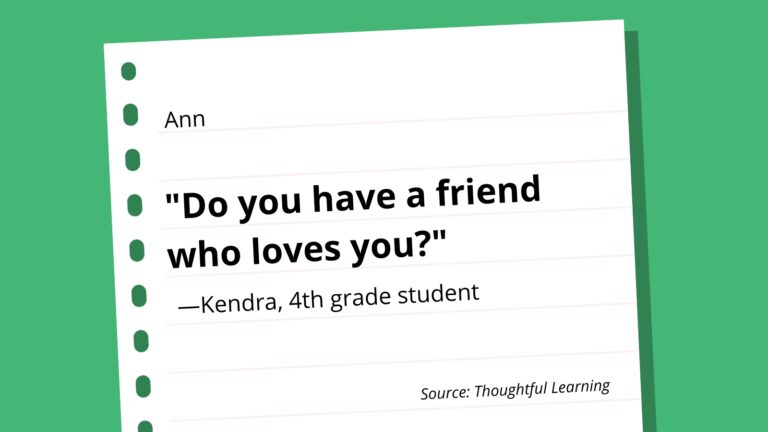
15 Inspiring Personal Narrative Examples for Writers
Reveal a part of yourself in your essay. Continue Reading
Copyright © 2024. All rights reserved. 5335 Gate Parkway, Jacksonville, FL 32256
Jump to navigation
- Inside Writing
- Teacher's Guides
Student Models
- Writing Topics
- Minilessons
- Shopping Cart
- Inside Grammar
- Grammar Adventures
- CCSS Correlations
- Infographics
Student Writing Models
How do I use student models in my classroom?
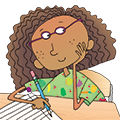
When you need an example written by a student, check out our vast collection of free student models. Scroll through the list, or search for a mode of writing such as “explanatory” or “persuasive.”
Jump to . . .
Explanatory writing.
- How Much I Know About Space Explanatory Paragraph
- My Favorite Pet Explanatory Paragraph
- Sweet Spring Explanatory Paragraph
Narrative Writing
- A Happy Day Narrative Paragraph
- My Trip to Mexico Narrative Paragraph
Creative Writing
- Happy Easter Story Paragraph
- Leaf Person Story
Research Writing
- Parrots Report
- If I Were President Explanatory Paragraph
- My Dad Personal Narrative
- The Horrible Day Personal Narrative
Response to Literature
- One Great Book Book Review
- A Fable Story
- Ant Poem Poem
- The Missing Coin Story
- Winter Words Poem
- Horses Report
- Ladybugs Report
- How to Make Boiled Eggs How-To
Persuasive Writing
- Plastic, Paper, or Cloth? Persuasive Paragraph
- The Funny Dance Personal Narrative
- The Sled Run Personal Narrative
- Hello, Spring! Poem
- Cheetahs Report
Business Writing
- Dear Ms. Nathan Email
- My Favorite Place to Go Description
- My Mother Personal Essay
- Rules Personal Essay
- Shadow Fort Description
- Adopting a Pet from the Pound Editorial
- Letter to the Editor Letter to the Editor
- Ann Personal Narrative
- Grandpa, Chaz, and Me Personal Narrative
- Indy’s Life Story Personal Narrative
- Jet Bikes Personal Narrative
- The Day I Took the Spotlight Personal Narrative
- A Story of Survival Book Review
- Chloe’s Day Story
- Did You Ever Look At . . . Poem
- Dreams Poem
- I Am Attean Poem
- Sloppy Joes Poem
- The Civil War Poem
- The Haunted House Story
- The Terror of Kansas Story
- When I Was Upside Down Poem
- Deer Don’t Need to Flee to Stay Trouble-Free! Report
- Height-Challenged German Shepherd Report
- Friendship Definition
- What Really Matters News Feature
- Cheating in America Problem-Solution
- Hang Up and Drive Editorial
- Musical Arts Editorial
- Summer: 15 Days or 2 1/2 Months? Editorial
- A Cowboy's Journal Fictionalized Journal Entry
- Giving Life Personal Narrative
- The Great Paw Paw Personal Narrative
- The Racist Warehouse Personal Narrative
- Limadastrin Poem
- The Best Little Girl in the World Book Review
- How the Stars Came to Be Story
- Linden’s Library Story
- My Backyard Poem
- The Call Poem
- I Am Latvia Research Report
- Mir Pushed the Frontier of Space Research Report
- The Aloha State Research Report
- The Incredible Egg Observation Report
- Unique Wolves Research Report
- Dear Dr. Larson Email
Personal Writing
- A Lesson to Learn Journal
- Caught in the Net Definition
- From Bed Bound to Breaking Boards News Feature
- If Only They Knew Comparison-Contrast
- Save the Elephants Cause-Effect
- Student Entrepreneur Reaches for Dreams of the Sky News Feature
- Internet Plagiarism Problem-Solution
- Mosquito Madness Pet Peeve
- Anticipating the Dream Personal Narrative
- Huddling Together Personal Narrative
- H’s Hickory Chips Personal Narrative
- It’s a Boy! Personal Narrative
- My Greatest Instrument Personal Narrative
- Snapshots Personal Narrative
- Take Me to Casablanca Personal Narrative
- The Boy with Chris Pine Blue Eyes Personal Narrative
- The Climb Personal Narrative
- The House on Medford Avenue Personal Narrative
- Adam’s Train of Ghosts Music Review
- Diary of Gaspard Fictionalized Journal Entry
- My Interpretation of The Joy Luck Club Literary Analysis
- Mama’s Stitches Poem
- The KHS Press Play
- Rosa Parks Research Report
- The Killer Bean Research Report
- Mid-Project Report on History Paper Email
- Vegetarian Lunch Options at Bay High Email
Narrative Essays: Examples And Topic Ideas For Students
Writing a narrative essay is a great way to share your life with others. Here, we’ll explore topics that will set you up to write a great narrative essay.
If you’re searching for a list of personal narrative essay topics, you’re likely writing a middle school, high school, or college essay. A personal narrative describes your life experience, usually from the first-person point of view.
There are many different approaches to take to writing a narrative essay. Good narrative essay topics are engaging and can be either serious or silly. A personal narrative is not an argument essay or a persuasive essay; rather, it tells a story from your point of view.
Narrative essay writers are constantly on the lookout for things that happen in their lives that teach a lesson, make a point, or tell a funny story. When brainstorming for the best topic for your narrative essay, think about something that happened in your life that you love sharing with others, and work to translate your story into written prose that will hook your readers.
Here, we’ll explore some of the best narrative essay topic examples and ideas, helping you get your writing started right.
For help with your essays, check out our round-up of the best essay checkers
| IMAGE | PRODUCT | |
|---|---|---|
| Grammarly | ||
| ProWritingAid |
Narrative Essay Examples
1. the power of potstickers by lauren brown, 2. everyone should have a best friend 30 years older than them by lucy holden, 3. all it takes is a small act of kindness by maddie huiras, 4. a reflection on working in labor & delivery by dr. amos grunebaum, md, 5. pressures of being a first generation american-born citizen by helen bezikyan, narrative essay topic ideas, 1. your first day of high school, 2. how you met your best friend, 3. your best birthday party, 4. your favorite (or most difficult) childhood memory, 5. your most embarrassing moment, 6. how you made a difficult decision, 7. an act of kindness, 8. a tribute to your first pet.
Although I find the exact measurements of recipes comforting, I do my best to add a pinch of this and a dash of that in my meals every so often. It’s how I get to go outside my comfort zone every day. And I see in myself a newfound wisdom: it’s ok to go off the beaten path, you can experiment, compromise can lead to something new and beautiful. My mother’s cooking taught me that and I expect to bring that with me wherever I may go.
In this food-based tribute to her mother’s ingenuity, Brown discusses important family memories while sharing lessons from her mother that she now carries through everyday life. The combination of rich descriptive language with an explanation of how the experience of cooking with her mother shaped her life draws the reader in, helping them to feel like they’re in the kitchen with Brown and her mother.
In short, we adopted each other as confidants and met regularly to discuss life in general. He was more supportive than anyone else I met during the whole three years and stepped out of his remit to give me tailored advice that definitely helped me to get a job in journalism. It was clear from the start that he cared more about what was right for me than what was right for the university league tables, perhaps because he actually knew me. When I told him I was worried that the long days I was doing in the student newspaper office would take a toll on my degree, he told me I could get a first if I wanted one, but thought the student paper stuff would help my career much more.
It can be hard to find a friend who knows you better than yourself, and Holden discusses that phenomenon in their essay on friendship. She discusses how her friend affected her life during their time together and how he affected her after being separated by distance. In this narrative essay, the author works to describe the feelings she experienced through the ups and downs of their friendship, writing about universal truths that all humans experience in relationships.
Throughout his life, he had gotten used to dealing with Dyskeratosis congenita, and as life went on, he eventually developed cancer; but even while battling cancer, my dad showed kindness. In fact, on the night before he passed away, even though he knew he wouldn’t be with us for much longer, he tried his best to focus on the positive stuff.
In this essay, Huiras reflects on the life and death of her father and celebrates his commitment to kindness to others throughout his life. While Huiras narrates the events that led to her father’s death, she also describes how his actions and character significantly affect her life, helping her grow into the woman she wants to be.
Labor & Delivery is getting tears in your eyes when you watch a couple you’ve connected with welcome their baby into the world. Even though you’ve just met and will likely never see each other again, there’s something special about sharing that experience that makes you feel like you’ve known each other forever. Labor & Delivery is a place full of opposites. A woman grieving a devastating loss can be in the room next door to a family celebrating a new addition and 14-year-old mother can be in the room next door to a 45-year-old mother. Regardless of the circumstances, each family that walks through the L&D doors will be forever changed.
In this essay on life behind the doors of the delivery room, Dr. Grunebaum shares what it’s like to both celebrate and grieve with families and how difficult it can be to manage both the chaos and joy that comes with the birth process. If you choose to write an essay about a process so personal as birth, leave out any details that could identify the people involved, as Grunebaum does in this essay.
The struggles that come with having immigrant parents may include constant seeking of approval, always having to be responsible, as well as immigrant parents discussing the future that they may have already planned for their child. More often than not, immigrant parents constantly remind their child, or children that they expect big and great things from them in the future, which is part of why they came to this country.
In this essay, Bezikyan discusses the unique pressures of being a first-generation American-born citizen. In addition to offering her perspective, she also offers the opinions of others in similar circumstances. This helps to support her opinion and help others see the shared experience of people born to immigrant parents.

Whether you’re a college or high school student, you likely remember your first day of high school—stepping away from middle school and becoming a young adult. The first day of high school is rife with emotion, and describing your experience can provide your reader with an interesting perspective on how you deal with transition and change.
When describing the big day, use details. Explain how you felt as you walked toward the door, how you felt when you struggled to find your classes, and what it was like opening your new locker for the first time. As you write, you may find it helpful to avoid technical details (like the minute-to-minute scheduling of your classes) and instead focus on unique or tough moments or how accomplished you felt by the end of the day.
Your best friend has been there for you through thick and thin, and writing about how the two of you met can be a fun narrative essay topic, no matter your age or writing level.
As you tell the story of how you met your best friend, describe how your connection grew over time. Perhaps you were thick as thieves right away, or you needed some time to realize that you’d met a lifelong friend. For some inspiration, reach out to your best friend and ask them what they remember from the day you met—it can be fun and fresh to get their perspective on how your first meeting went.
Birthdays are a time to celebrate, and writing about a particularly excellent birthday can be a great topic for your narrative essay. When discussing your best birthday party, include all details, including who you invited, what you ate, and how you celebrated with family and friends.
You may also want to talk about why that particular birthday was so meaningful to you. If it was a landmark birthday (like your sweet 16) or a special event (like your last birthday party at home before you left for college), be sure to mention this, so your reader understands why this event was so significant in your life.
There’s no way around it: traumatic things happen in childhood, and wonderful things happen. Writing about childhood memories can be relatable and provide an instant connection with your readers.
When choosing a favorite childhood memory to write about, think back to memorable times in your life because they’re connected with strong emotions. Perhaps you want to write about when your baby sibling came home from the hospital or your first baseball game.
If you choose to write about a difficult childhood memory, the process for choosing a topic is still the same. Think back to a childhood memory that evokes strong emotion. While writing about a negative childhood memory can be an excellent way to write a compelling personal essay, it can also bring up challenging thoughts and may feel traumatic.
Have a particular time that made you red in the face? Writing about an embarrassing moment is relatable and can provide a humorous topic for your narrative essay.
When writing about your embarrassing moment, it can be helpful if you’re willing to laugh at yourself and find the humor in the situation you went through. Be sure to describe what happened from start to finish, painting a clear picture of the moment for your readers. Describe your emotions as the embarrassing moment occurred, and talk about what happened after the moment was over.
Wrestling with a difficult decision can feel impossible at the moment, and reflecting on the experience of making a difficult decision to your readers can make for an excellent narrative essay topic.
When you’re talking about a difficult decision in your narrative essay, give plenty of background information so that the reader fully understands why you’re wrestling with a tough choice. Don’t give away your decision at the start of the essay; rather, take the reader through your thought process as you had to decide what to do.
Sharing an act of kindness you did with someone else—or a random act of kindness that someone did for you—can provide a warm, fuzzy topic for your narrative essay. When writing about an act of kindness, focus on how the act made you feel, whether you were the giver or the receiver of the act.
Much like writing about meeting your best friend for the first time, it can be helpful to talk about your state of mind before and after the act of kindness occurred. Perhaps you were going through a tough time, and the act of kindness helped to boost your mood. Explaining the emotions that came with the act of kindness and the facts of the situation can help your reader feel connected to your story.

Whether you have a dog, a cat, or something more exotic, many readers will be able to connect with the love that a kid has for their first pet. When writing a narrative essay about your first pet, please explain how you felt the first time you laid eyes on them. This may mean describing when they were first presented to you as a kitten or a puppy or the first time you saw your older rescue pet.
Talk about the qualities you loved most about your pet, whether that was their ability to comfort you after a bad day or how they were never too old or tired to go outside and play frisbee. Focus both on the descriptive qualities of your pet that allow your reader to imagine what they looked like and the emotional qualities that keep your first pet near and dear to your heart to this day.
If you have a pet currently, you can mention them in your narrative essay about your first pet, talking about their qualities that remind you of your first pet. While it can tug at your heartstrings to describe the memory of your first pet, writing about the love you have for an animal is nearly universally relatable, and your readers will love hearing about your fond memories of your furry friend.
Tip: If writing an essay sounds like a lot of work, simplify it. Write a simple 5 paragraph essay instead.
If you’re still stuck, check out our available resources for essay writing topics .
- Share full article
Advertisement
Supported by
The Winners of Our Personal Narrative Essay Contest
We asked students to write about a meaningful life experience. Here are the eight winning essays, as well as runners-up and honorable mentions.

By The Learning Network
Update: Join our live webinar on Oct. 8 about teaching with our Narrative Writing Contest.
In September, we challenged teenagers to write short, powerful stories about meaningful life experiences for our first-ever personal narrative essay contest .
This contest, like every new contest we start, was admittedly a bit of an experiment. Beyond a caution to write no more than 600 words, our rules were fairly open-ended, and we weren’t sure what we would get.
Well, we received over 8,000 entries from teenagers from around the world. We got stories about scoring the winning goal, losing a grandparent, learning to love one’s skin and dealing with mental illness. We got pieces that were moving, funny, introspective and honest. We got a snapshot of teenage life.
Judging a contest like this is, of course, subjective, especially with the range of content and styles of writing students submitted. But we based our criteria on the types of personal narrative essays The New York Times publishes in columns like Lives , Modern Love and Rites of Passage . We read many, many essays that were primarily reflective but, while these pieces might be well-suited for a college application, they weren’t exactly the short, powerful stories we were looking for in this contest.
The winning essays we selected were, though, and they all had a few things in common that set them apart:
They had a clear narrative arc with a conflict and a main character who changed in some way. They artfully balanced the action of the story with reflection on what it meant to the writer. They took risks, like including dialogue or playing with punctuation, sentence structure and word choice to develop a strong voice. And, perhaps most important, they focused on a specific moment or theme — a conversation, a trip to the mall, a speech tournament, a hospital visit — instead of trying to sum up the writer’s life in 600 words.
Below, you’ll find these eight winning essays, published in full. Scroll to the bottom to see the names of all 35 finalists we’re honoring — eight winners, eight runners-up and 19 honorable mentions. Congratulations, and thank you to everyone who participated!
We are having trouble retrieving the article content.
Please enable JavaScript in your browser settings.
Thank you for your patience while we verify access. If you are in Reader mode please exit and log into your Times account, or subscribe for all of The Times.
Thank you for your patience while we verify access.
Already a subscriber? Log in .
Want all of The Times? Subscribe .

Personal Narrative
Ai generator.

Personal narratives are a window into individual experiences, offering a vivid glimpse of real-life events and emotions. This guide is your key to mastering the art of personal narrative writing. Perfect for students, educators, and anyone keen on storytelling, it provides clear examples and step-by-step instructions. Whether you’re crafting a school assignment or exploring self-expression, learn how to create compelling narratives that resonate with your audience. Embrace the journey of personal narrative writing and unlock your storytelling potential.
What is Personal Narrative? – Definition A personal narrative is like sharing a piece of your life story with others. It’s a type of writing where you talk about a real experience from your life. You write it as if you are telling a friend about something that happened to you. In a personal narrative, you talk about your feelings, thoughts, and what you learned from that experience. It’s like writing a diary entry that others can read. The main point is to share a part of your life in a way that is interesting and meaningful to the reader.
Writing out something like a personal summary for your readers to know about can be both daunting and exciting. The topic would be about you. If given the chance to write something about you to share to the world, would you have taken up that opportunity?
Best Example of Personal Narrative
Title: “The Day I Conquered My Fear” It was a bright summer morning, the kind that promised adventures. My heart pounded as I stood at the edge of the high diving board, peering into the deep blue pool below. I was always afraid of heights, and here I was, facing my biggest fear. The diving board felt like a plank leading to the unknown. Below, my friends cheered, their voices a blend of excitement and encouragement. I closed my eyes, took a deep breath, and recalled my dad’s words, “Courage is not the absence of fear, but the triumph over it.” With that thought, I leaped. The wind rushed past me as I plummeted, the world a blur of sky and water. Then, with a splash, I was submerged in the cool embrace of the pool. Surfacing, I heard the triumphant cheers of my friends. In that moment, I realized I had done more than just dive; I had overcome a barrier within myself. That day, I learned that facing your fears, no matter how daunting, is a journey worth taking. It’s not just about the action itself, but the sense of achievement and self-discovery that comes with it. This experience taught me that courage was always a part of me, waiting to be awakened.
What are the Major Components of Personal Narrative
Personal narratives are powerful pieces of writing that allow you to share a piece of your life. To make them effective and engaging, certain key components are essential:
- Introduction: This is where you set the scene for your story. Introduce the main event or experience and provide some background information. It’s important to hook the reader’s interest right from the start.
- Characters: In a personal narrative, you are the main character. You may also include other people who played significant roles in your story. Describe them in a way that makes them real and relatable to your readers.
- Setting: Describe where and when your story took place. The setting provides a backdrop for your narrative, giving context to your experiences.
- Plot: This is the sequence of events in your story. A good plot has a beginning, where you set up your story; a middle, where the main events and actions happen; and an end, where you resolve the story and reflect on its meaning.
- Conflict: Most narratives have some form of conflict or challenge that you faced. This could be an external event or an internal struggle. The conflict is crucial as it drives the story forward and keeps the reader engaged.
- Climax: This is the peak of your story, the most intense point of the narrative. It’s usually the moment when the conflict reaches its height.
- Resolution: Here, you wrap up the story. The resolution addresses the outcome of the conflict and often includes personal reflection on the events.
- Personal Reflection: In a personal narrative, reflecting on what you learned or how you changed is vital. This reflection helps to give deeper meaning to your story and can provide insight for your readers.
- Descriptive Language: Using vivid descriptions and sensory details helps to bring your story to life. It allows readers to see, hear, feel, and experience the events as if they were there.
- First-Person Narrative: Since personal narratives are about your own experiences, they are typically written in the first person, using ‘I.’
How to Write a Personal Narrative
Writing a personal narrative is like telling a story from your life. It’s about sharing your experiences, feelings, and lessons learned in a way that engages and connects with your readers. Here’s a step-by-step guide to help you write a compelling personal narrative:
- Choose Your Experience: Start by picking a significant event or moment from your life. It should be something meaningful that you feel comfortable sharing and that has had an impact on you.
- Brainstorm Ideas: Before you start writing, take some time to think about the details of your story. Remember the people involved, the setting, what happened, and how it affected you. Jotting down these points can help organize your thoughts.
- Create an Outline: Organize your story with a clear beginning, middle, and end. This will help you structure your narrative and ensure it flows logically.
- Write the Introduction: Begin with a hook to grab the reader’s attention. Introduce the setting and give some background to set the stage for your story.
- Develop the Body: This is where you narrate the events. Describe the actions, settings, and people involved. Use vivid details and sensory language to make the story come alive. Don’t forget to express your thoughts and feelings as the events unfold.
- Include the Climax: Every good story has a high point or a turning moment. This is where the main event or conflict reaches its peak. Make sure your climax is engaging and conveys the significance of your story.
- Review and Revise: After writing your first draft, read it through. Check for any areas that need more detail or clarification. Pay attention to the flow of the story and make sure it’s easy to follow.
Personal Narrative Topics and Ideas
- Personal narrative about my Best friend
- Personal narrative about Christmas
- Personal narrative about a Trip
- Personal narrative about Family
- Personal narrative about Myself
- Personal narrative about Childhood memories
- Personal narrative about my Birthday
- Personal narrative on Individualism
- Personal narrative on Anxiety
- Personal narrative on Identity
100+ Personal Narrative Examples
1. personal narrative template.
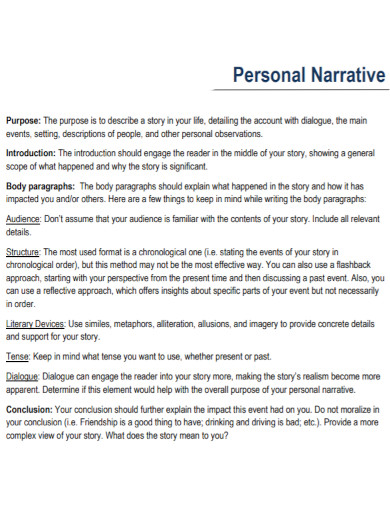
Size: 175 KB
2. Writing a Personal Narrative
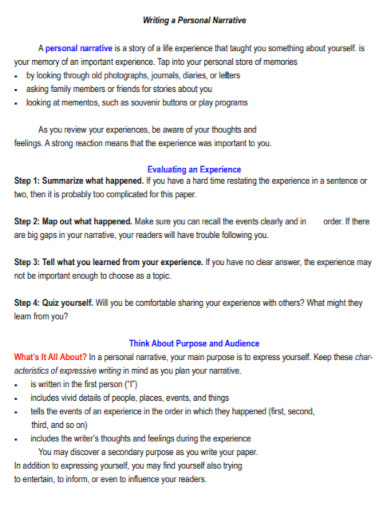
houstonisd.org
Size: 43 KB
3. Personal Narrative Essays
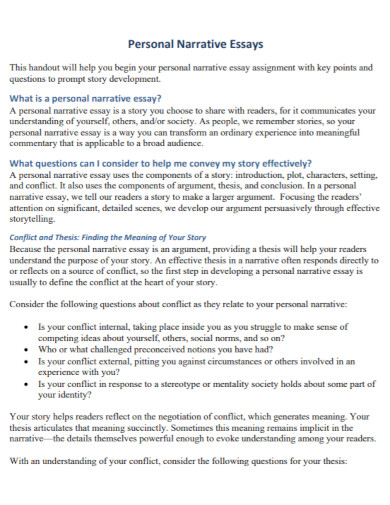
Size: 170 KB
4. Simple Personal Narrative
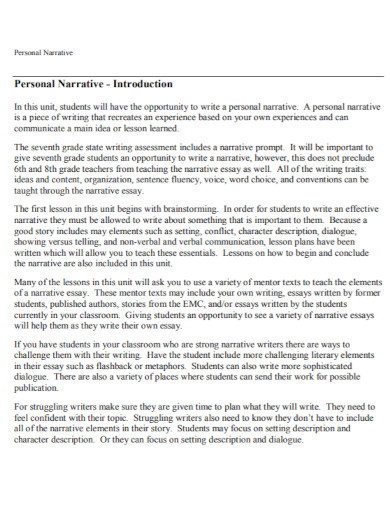
Size: 456 KB
5. Personal Narrative Building Blocks
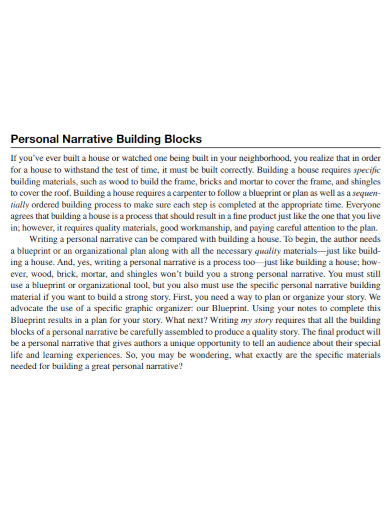
ptgmedia.pearsoncmg.com
Size: 134 KB
6. Sample Personal Narrative
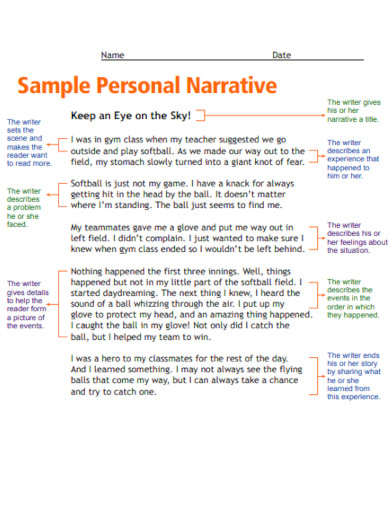
Size: 651 KB
7. Personal Narrative Training Preparation
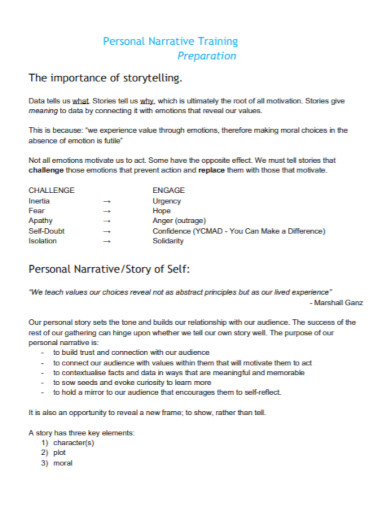
cloudfront.net
Size: 291 KB
8. Personal Narrative Elements
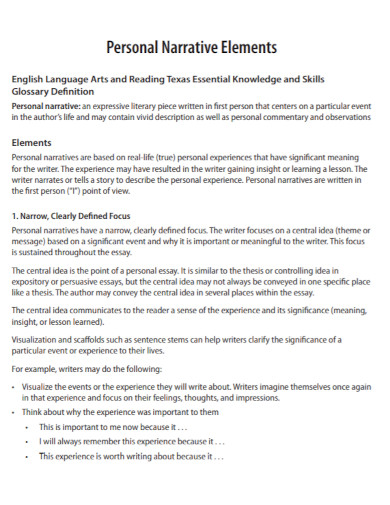
Size: 414 KB
9. Personal Narrative and Memoir
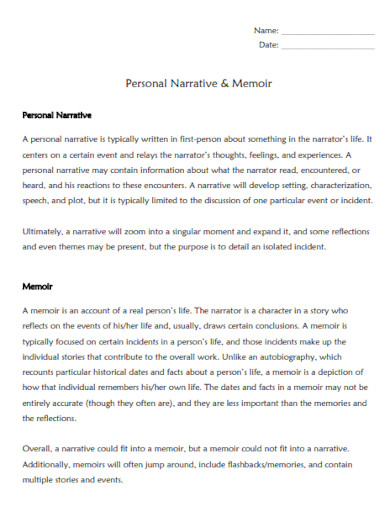
Size: 20 KB
10. Strategies for Generating Personal Narrative
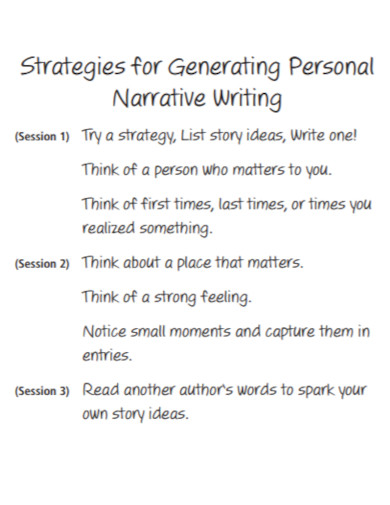
mrskewriga.westborough.org
11. Structure of a Personal Narrative Essay
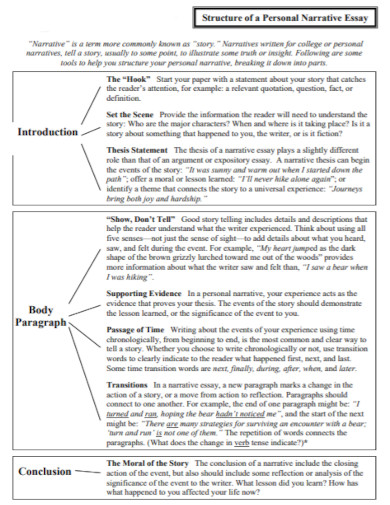
Size: 72 KB
12. Personal Narrative College Essay
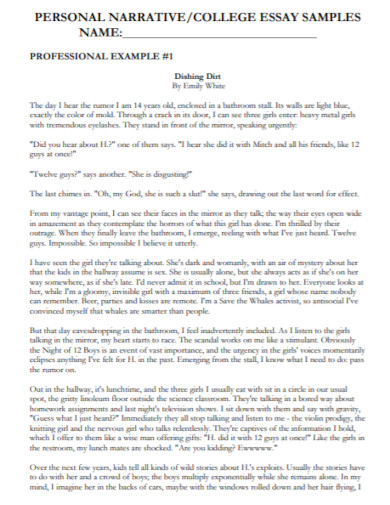
learning.hccs.edu
Size: 589 KB
13. Features of a Personal Narrative
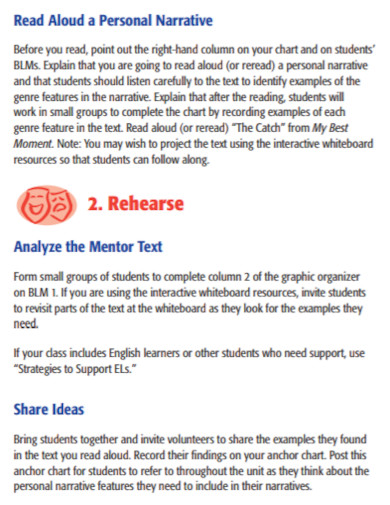
resources.benchmarkeducation.com
Size: 409 KB
14. Personal Narrative Score Point
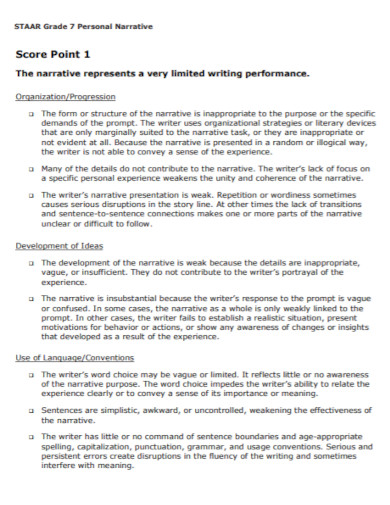
tea.texas.gov
15. Skills Acquired Through Personal Narrative
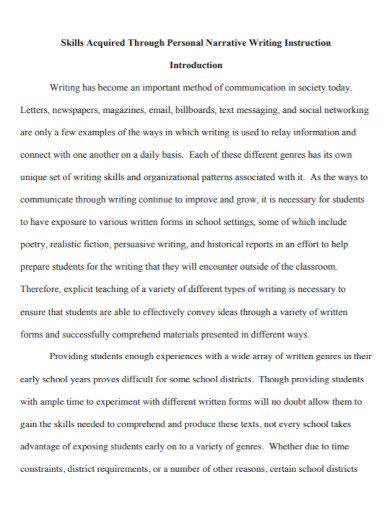
Size: 209 KB
16. True Personal Narrative
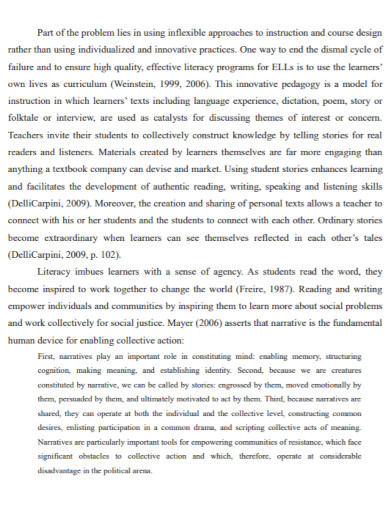
files.eric.ed.gov
Size: 80 KB
17. Student Personal Narrative
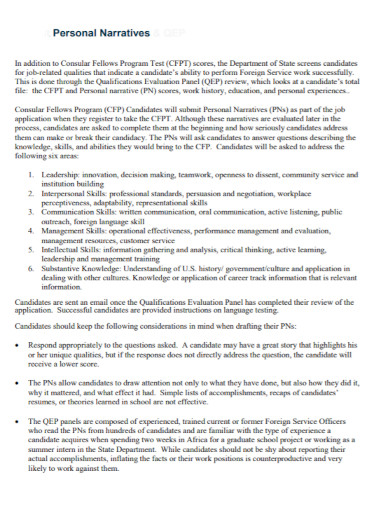
careers.state.gov
Size: 37 KB
18. Personal Narrative with Adjectives and Adverbs
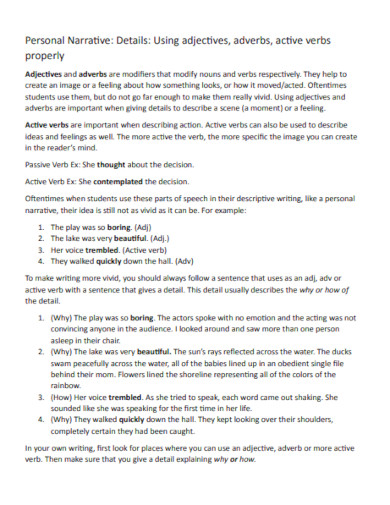
Size: 376 KB
19. Re-Framing Personal Narrative
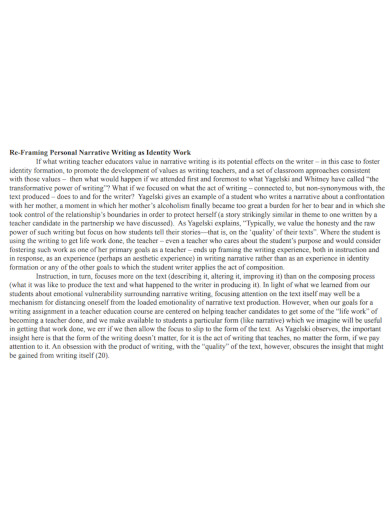
scholarworks.wmich.edu
Size: 393 KB
20. Personal Narrative Handout
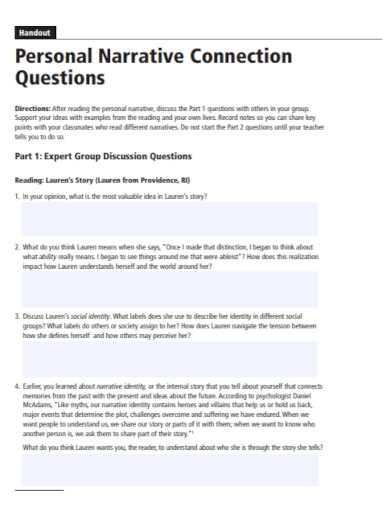
facinghistory.org
Size: 46 KB

21. Personal Narrative in PDF
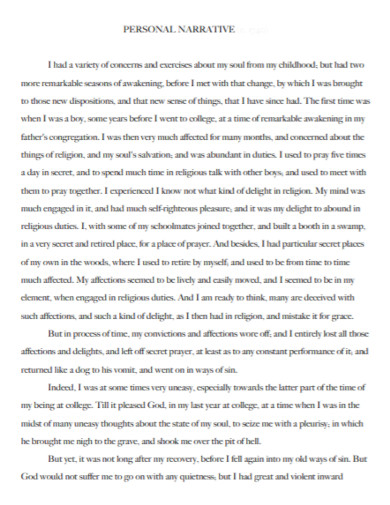
public.wsu.edu
Size: 129 KB
22. Peer Review of Personal Narrative
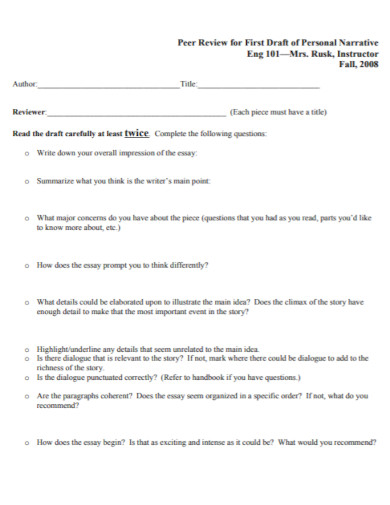
Size: 63 KB
23. Personal Narrative Peer Feedback Form
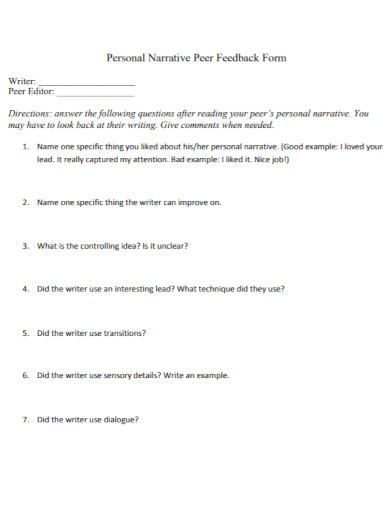
digitalcommons.trinity.edu
Size: 382 KB
24. Personal Narrative Idea List
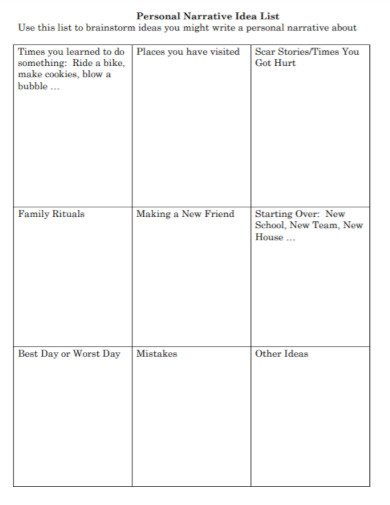
southamptonschools.org
Size: 271 KB
25. Personal Narrative Essay Example
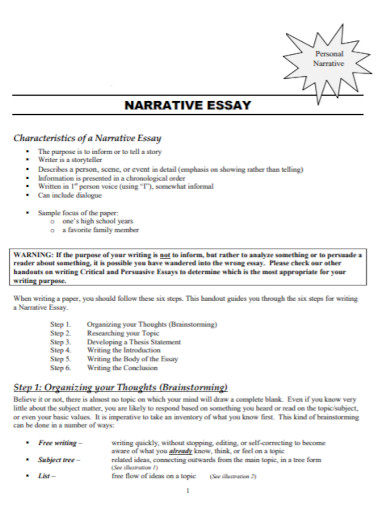
Size: 277 KB
26. Personal Narrative Sample Paper
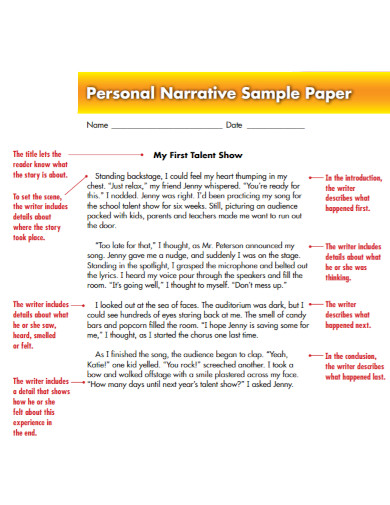
lincolnparkboe.org
Size: 276 KB
27. Personal Narrative Lesson
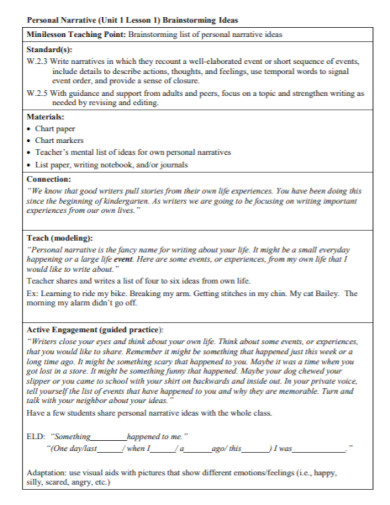
trenton.org
Size: 763 KB
28. Graphic Organizer Personal Narrative Essay
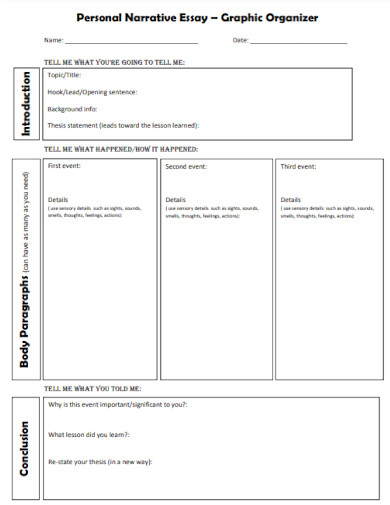
campbellcountyschools.org
Size: 51 KB
29. Personal Narrative Assignment
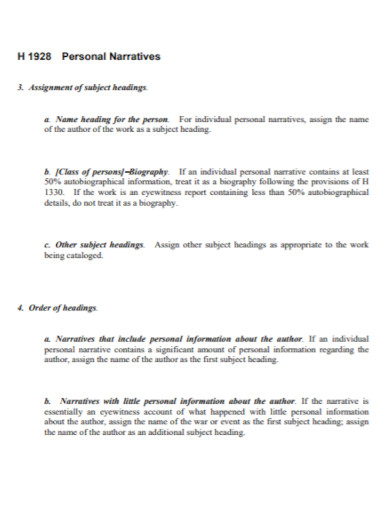
Size: 33 KB
30. Personal Narrative Essay in PDF
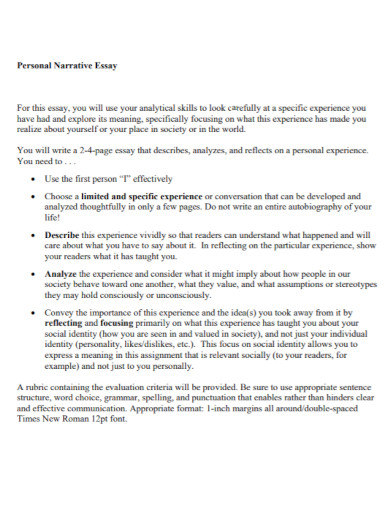
english.cofc.edu
Size: 117 KB
31. Personal Narrative Lesson Plan
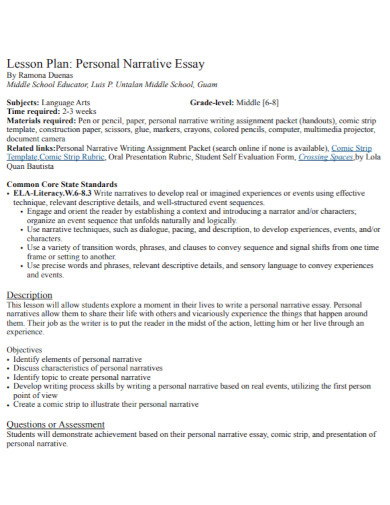
guampedia.com
Size: 83 KB
32. Personal Narrative Formal Essay
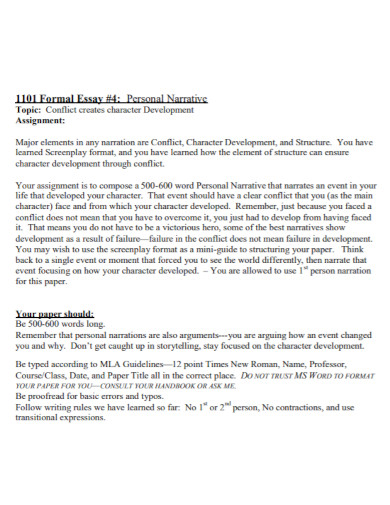
frontdoor.valenciacollege.edu
Size: 154 KB
33. General Personal Narrative
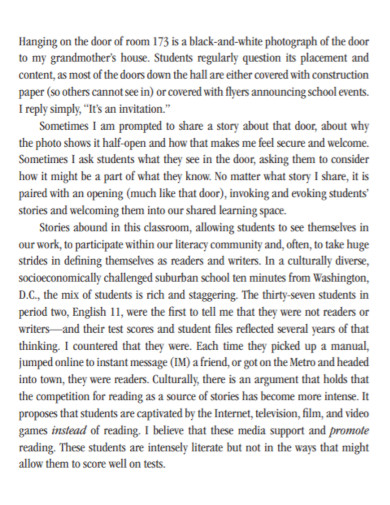
stenhouse.com
Size: 167 KB
34. Using Dialogue in a Personal Narrative
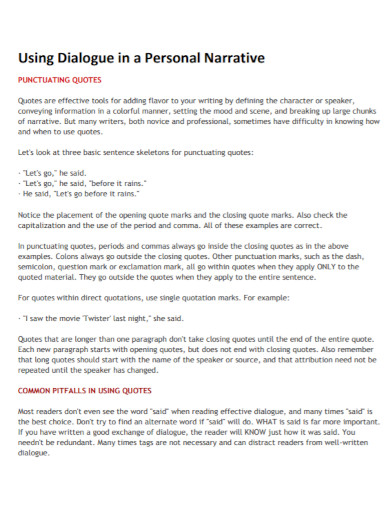
chrisrossarthur.com
Size: 194 KB
35. Personal Narrative as a Research
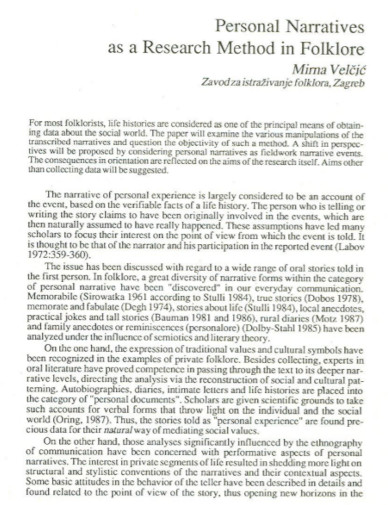
hrcak.srce.hr
36. Personal Narrative Rubric
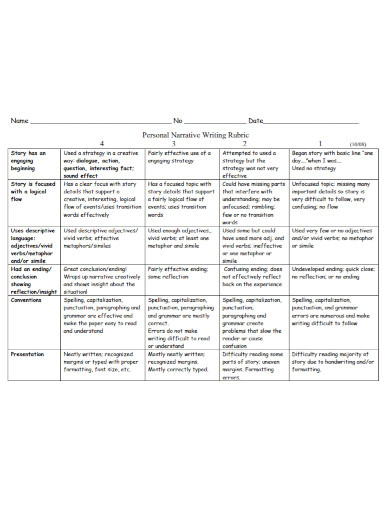
Size: 23 KB
37. Standard Personal Narrative in PDF
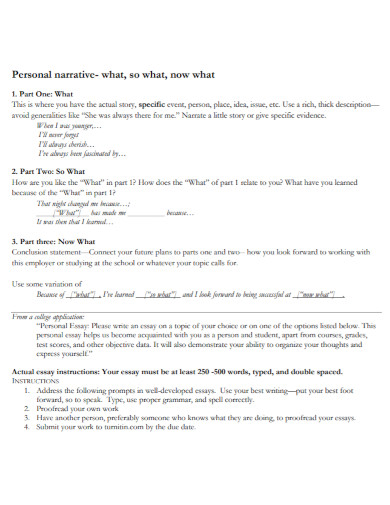
dentonisd.org
Size: 102 KB
38. Personal Narrative for School Students
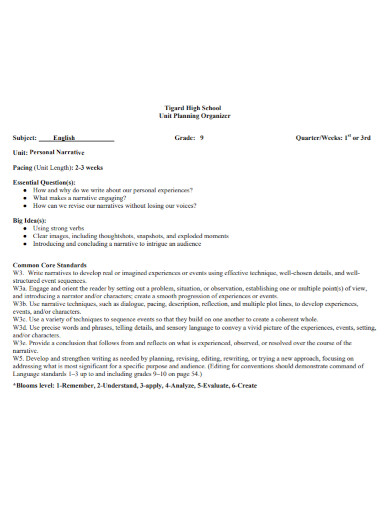
ttsdschools.org
Size: 57 KB
39. Elaboration of Personal Narrative
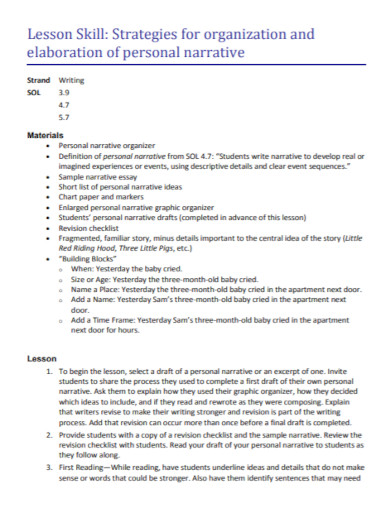
doe.virginia.gov
Size: 87 KB
40. Characteristics of a Personal Narrative
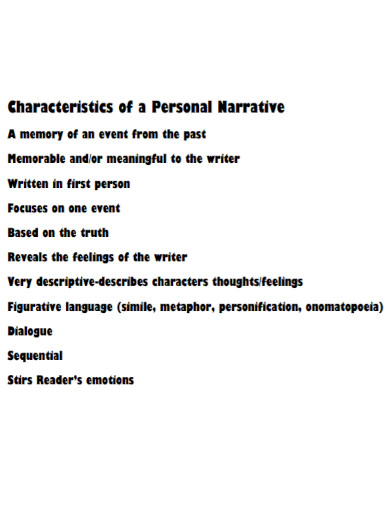
cabarrus.nc.us
Size: 96 KB
41. Personal Narrative and Policy
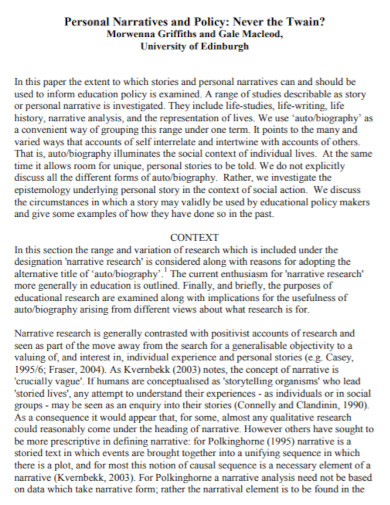
pure.ed.ac.uk
Size: 453 KB
42. Personal Narrative Plot Diagram
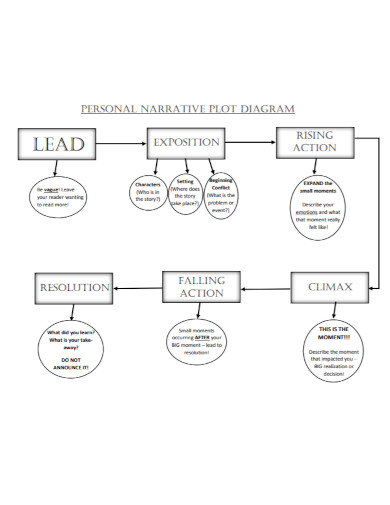
43. Healing through Personal Narrative
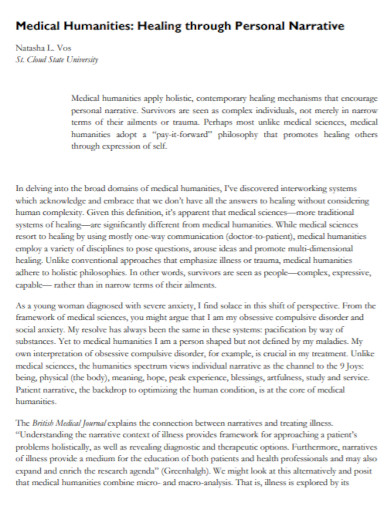
repository.stcloudstate.edu
Size: 111 KB
44. Engaging Personal Narrative
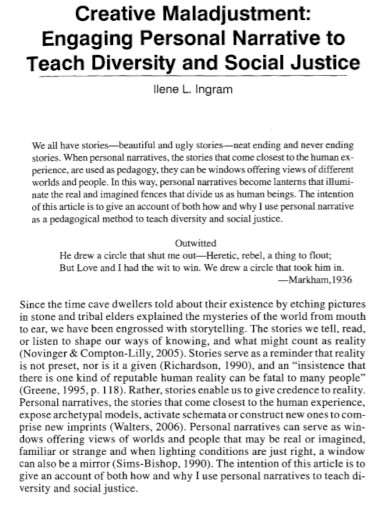
digitalcommons.unl.edu
Size: 750 KB
45. Literary Folkloristics and the Personal Narrative
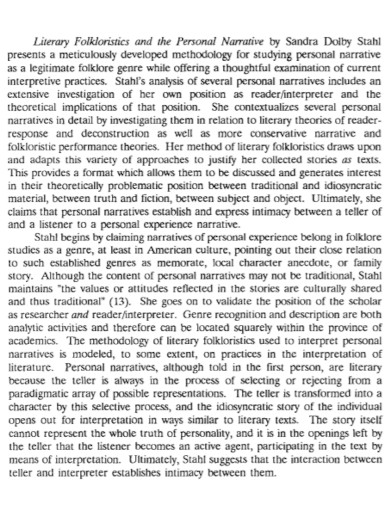
scholarworks.iu.edu
Size: 140 KB
46. Personal Narrative Prompt
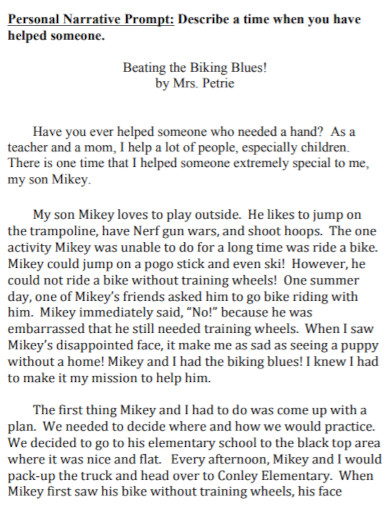
Size: 62 KB
47. Life History and Personal Narrative
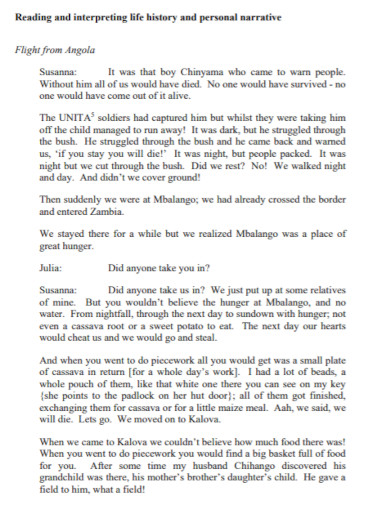
Size: 105 KB
48. The Power of a Personal Narrative
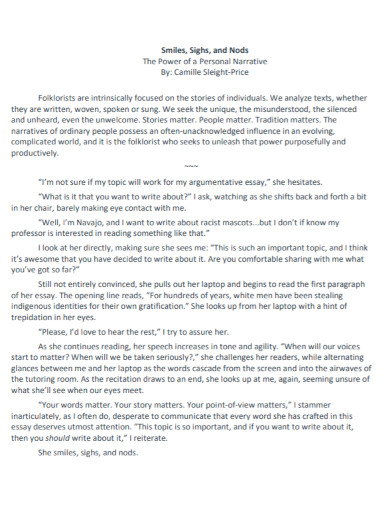
digitalcommons.usu.edu
Size: 250 KB
49. Personal Narrative Database
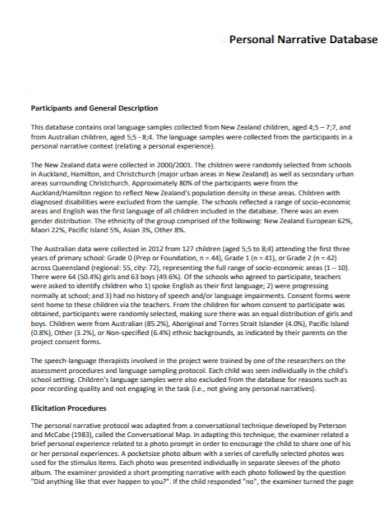
saltsoftware.com
Size: 788 KB
50. Personal Narrative Example
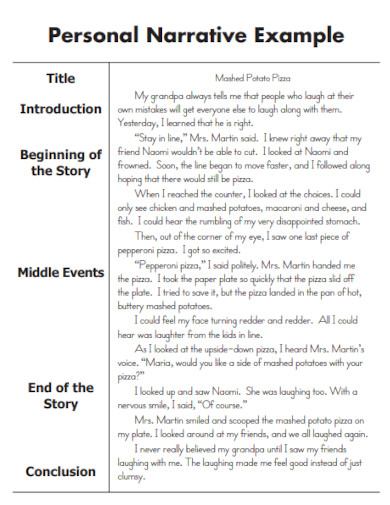
testprepshsat.com
Size: 116 KB
51. Personal Narrative Notes
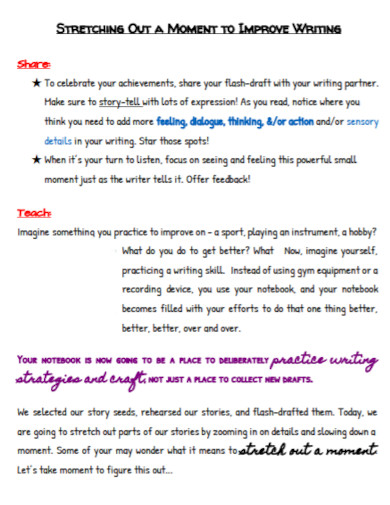
livingston.org
Size: 740 KB
52. Basic Personal Narrative
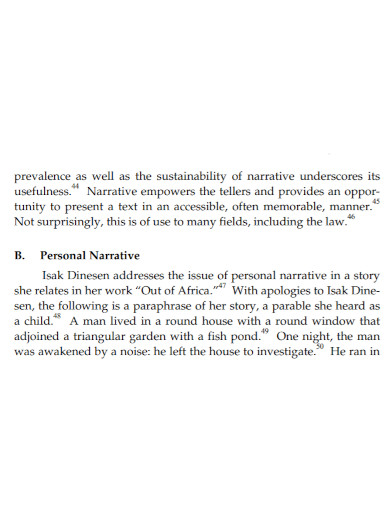
theelderlawjournal.com
Size: 380 KB
53. Personal Narrative Performances
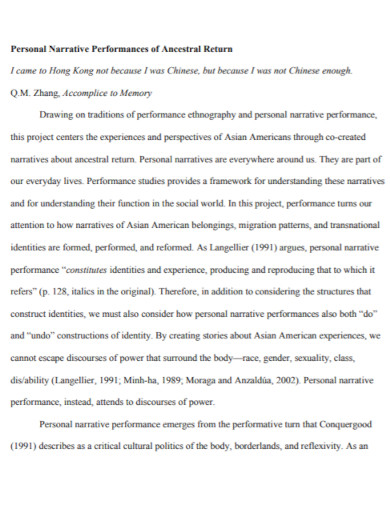
scholarworks.umass.edu
Size: 10 MB
54. Working Therapeutically with Personal Narrative
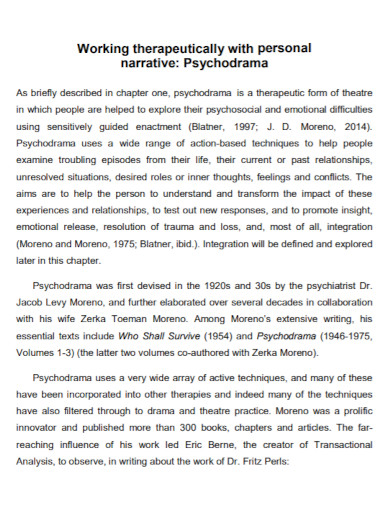
ore.exeter.ac.uk
55. Brainstorming Your Personal Narrative Topic
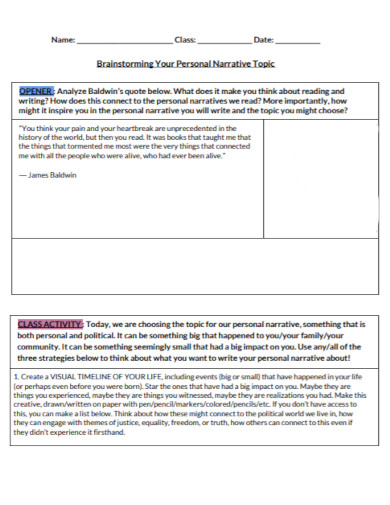
pulitzercenter.org
56. Personal Narrative Essay Format
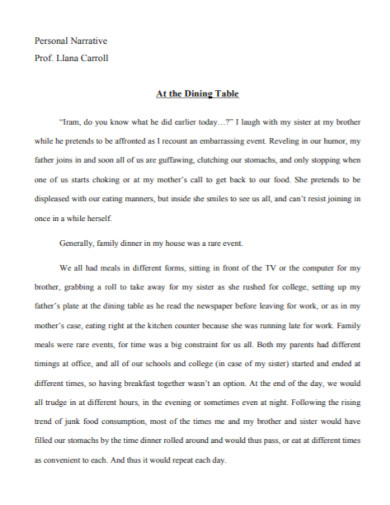
Size: 77 KB
57. Personal Narrative About an Incident
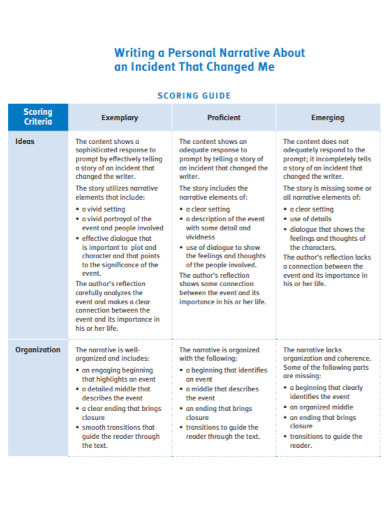
campbell.ky.us
Size: 419 KB
58. Feminist Personal Narrative

mospace.umsystem.edu
Size: 984 KB
59. Individual Personal Narrative
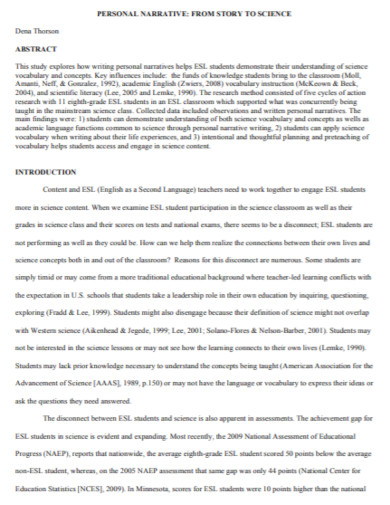
conservancy.umn.edu
Size: 253 KB
60. Personal Narrative Research Project
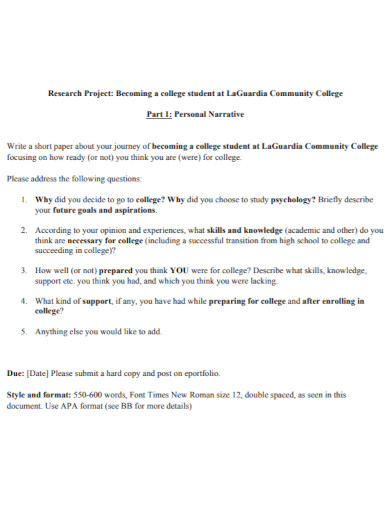
academicworks.cuny.edu
Size: 163 KB
61. Personal Narrative Disclosure
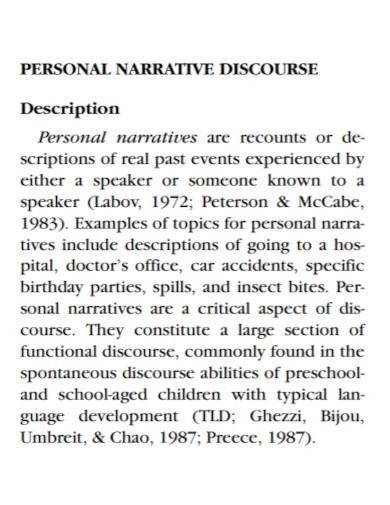
downloads.lww.com
Size: 115 KB
62. Personal Narrative Outline
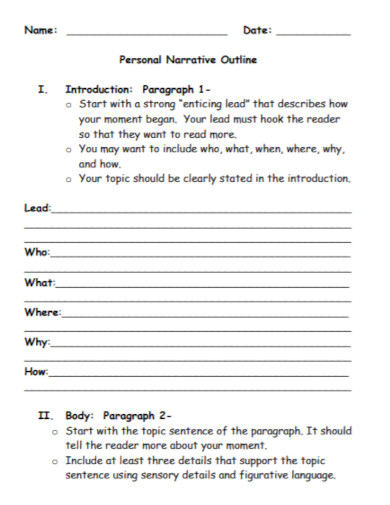
midwayisd.org
Size: 48 KB
63. Sample Personal Narrative Essay
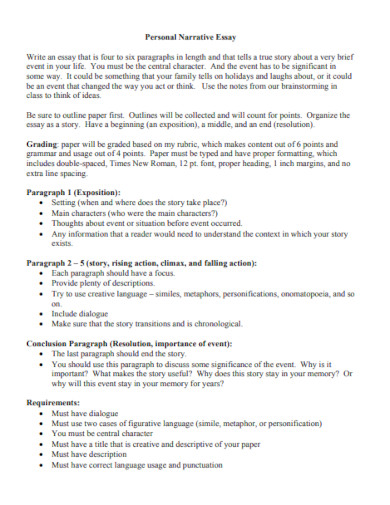
dukeofdefinition.com
64. The Need for Personal Narrative
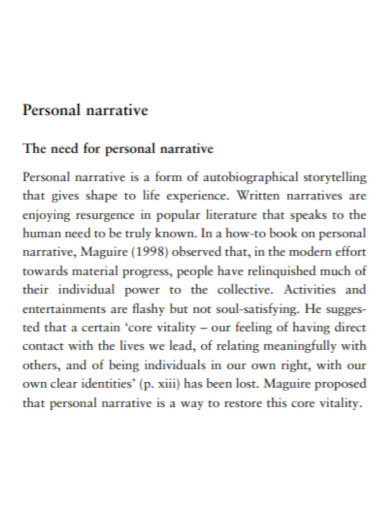
self-definingmemories.com
Size: 59 KB
65. Draft Personal Narrative
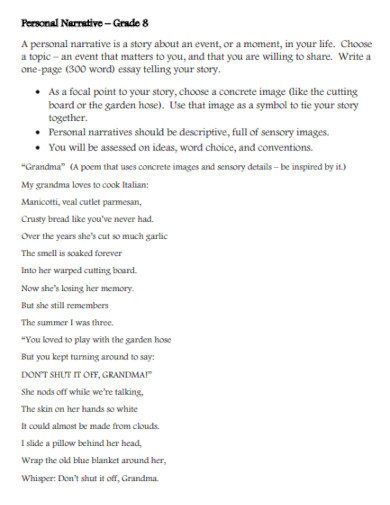
Size: 42 KB
66. Detailed Personal Narrative
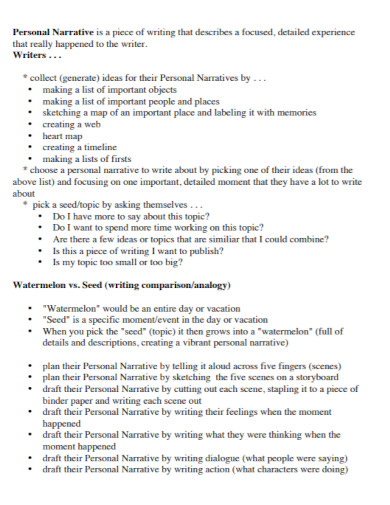
schoolwires.net
Size: 47 KB
67. Personal Narrative Assignment Sheet
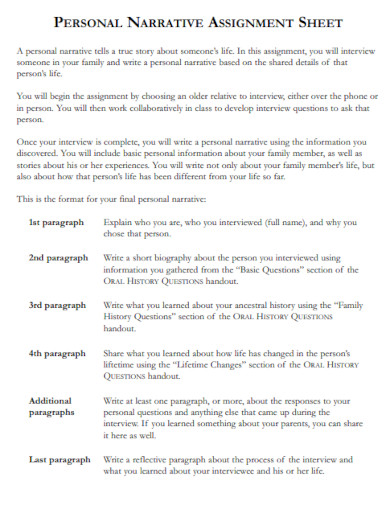
readwritethink.org
68. Centrality of Personal Narrative
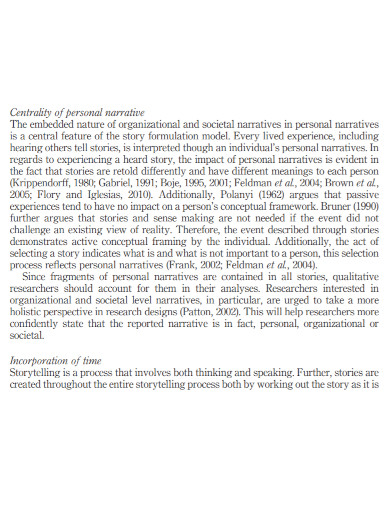
farapaper.com
Size: 132 KB
69. Analysis of Personal Narrative
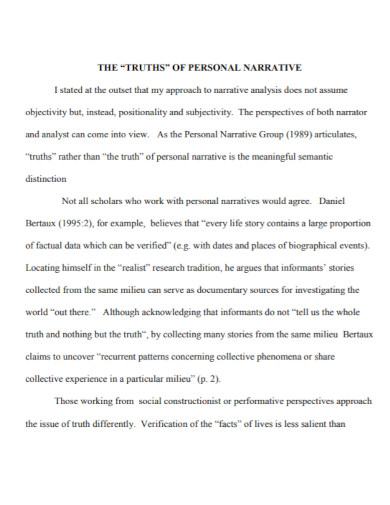
Size: 289 KB
70. Kindergarten Personal Narrative
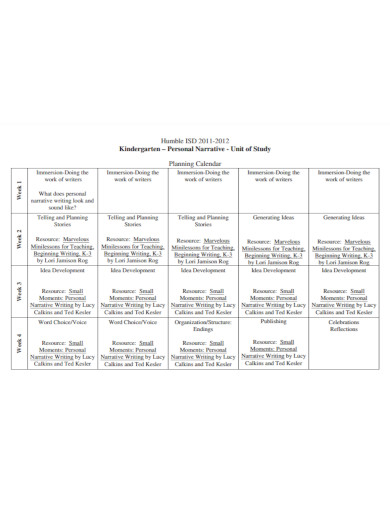
humbleisd.net
71. Critical Personal Narrative
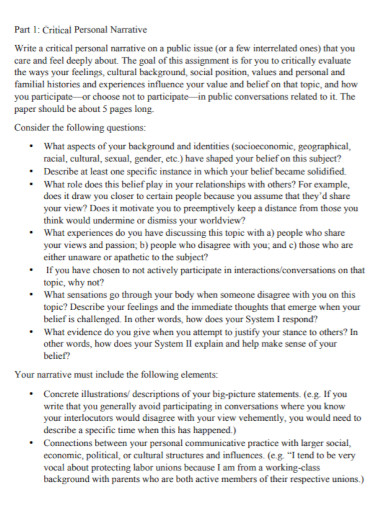
compositionforum.com
Size: 82 KB
72. Personal Narrative Sculpture
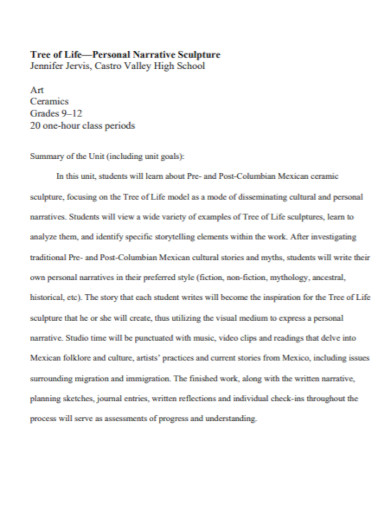
lanic.utexas.edu
Size: 466 KB
73. Developing Personal Narrative
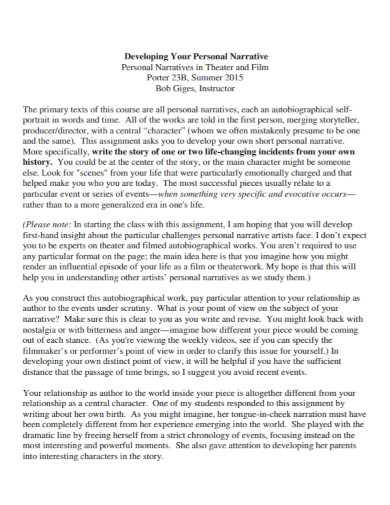
summer.ucsc.edu
Size: 35 KB
74. Narratives of Personal Experience
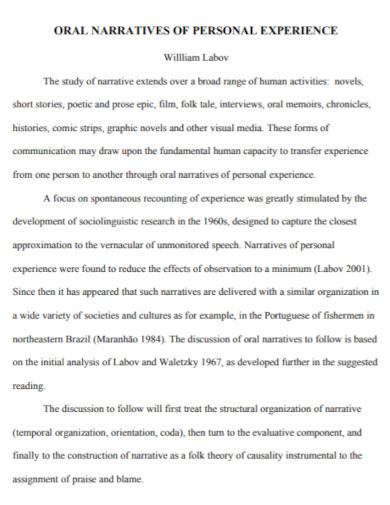
ling.upenn.edu
Size: 146 KB
75. Personal Narrative for Internship
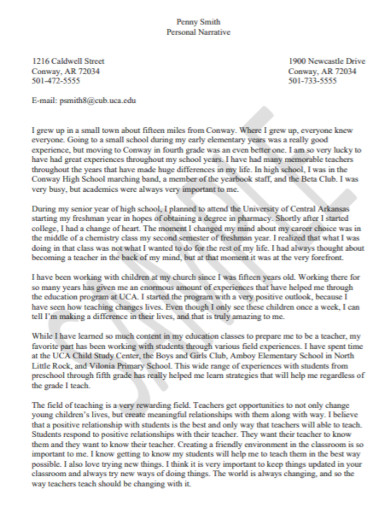
Size: 70 KB
76. Personal Narrative in PDF Template
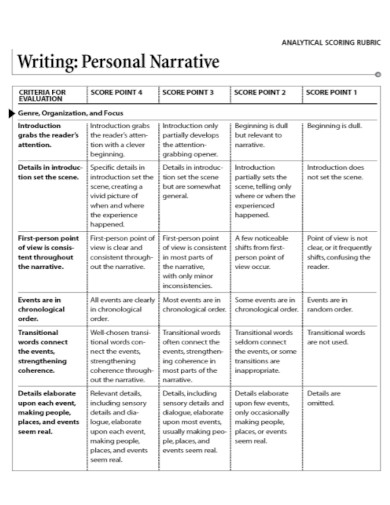
yourcharlotteschools.net
Size: 301 KB
77. Personal Narrative Prewriting
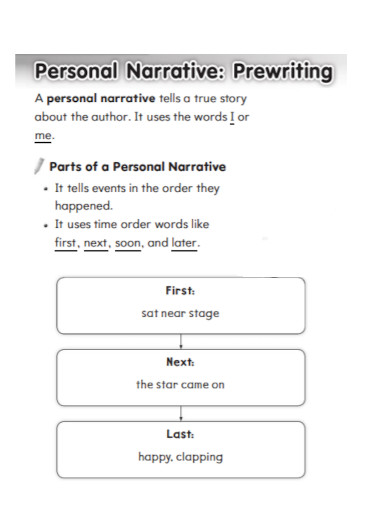
peoriapublicschools.org
78. Personal Narrative and Digital Storytelling
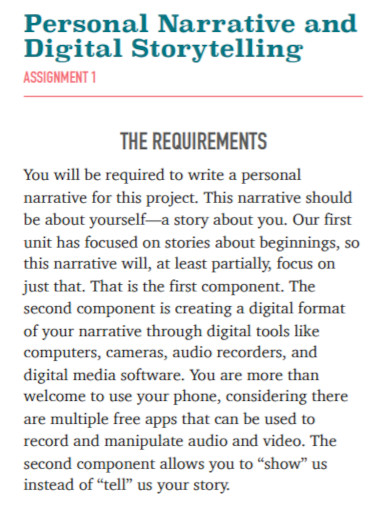
iris.siue.edu
Size: 29 KB
79. Personal Narrative Case Study
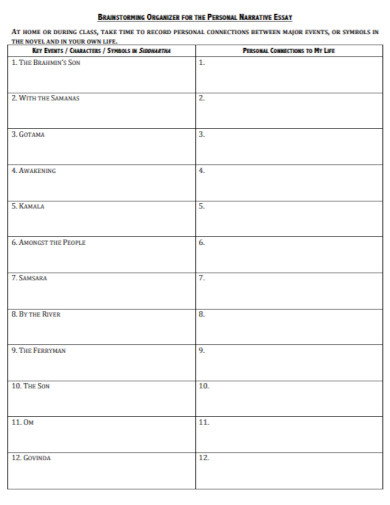
vhstigers.org
Size: 737 KB
80. Subjectivity in Personal Narrative
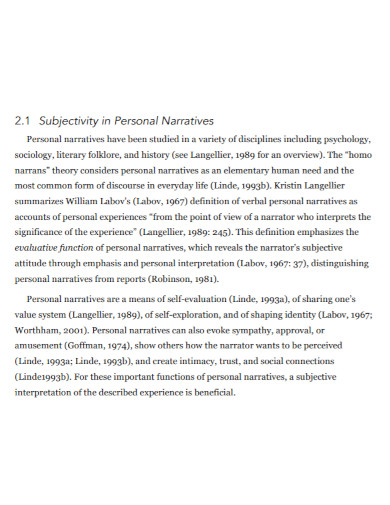
hal.archives-ouvertes.fr
Size: 13 MB
81. Oral Personal Narrative
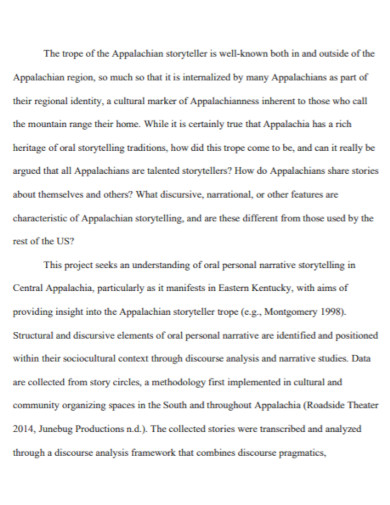
uknowledge.uky.edu
Size: 670 KB
82. Personal Narrative Reflection
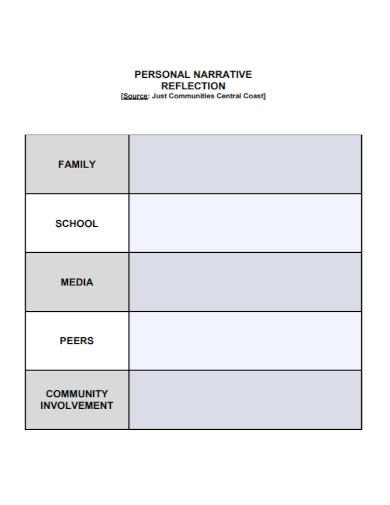
inclusiveva.org
Size: 678 KB
83. A Personal Narrative for Child Care
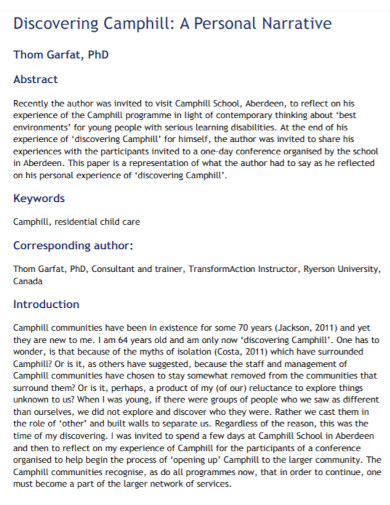
Size: 131 KB
84. Simple Personal Narrative Examples
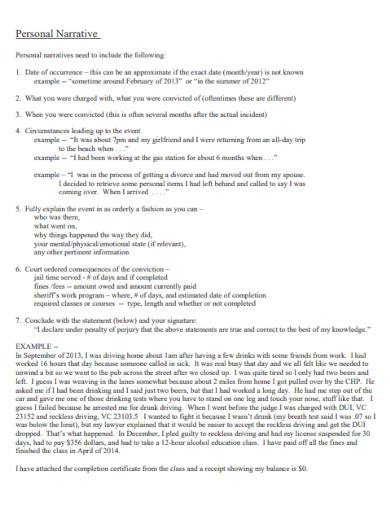
Size: 18 KB
85. Teacher’s Personal Narrative
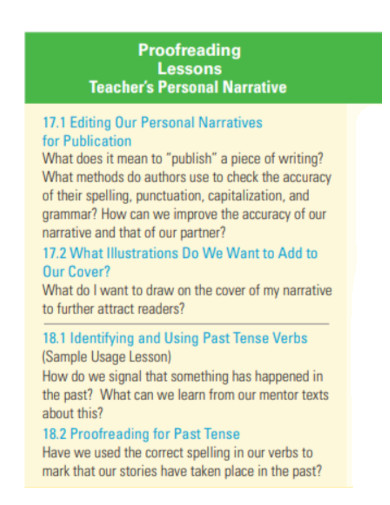
paterson.nj.us
86. Diving Deeper into Personal Narratives
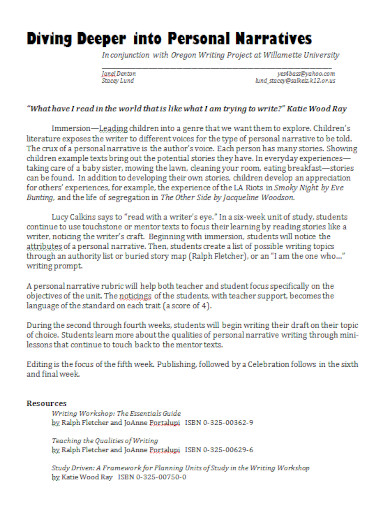
ode.state.or.us
87. Personal Narrative Essay Planning
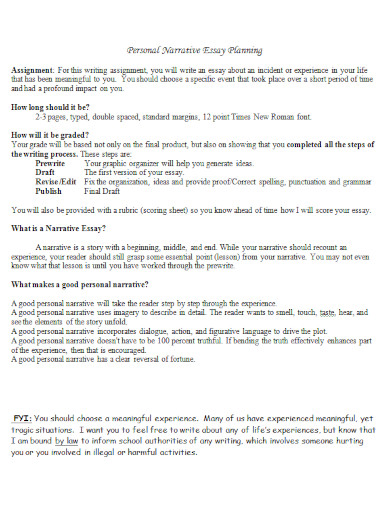
wordpress.com
Size: 14 KB
88. Personal Narrative Essay Template
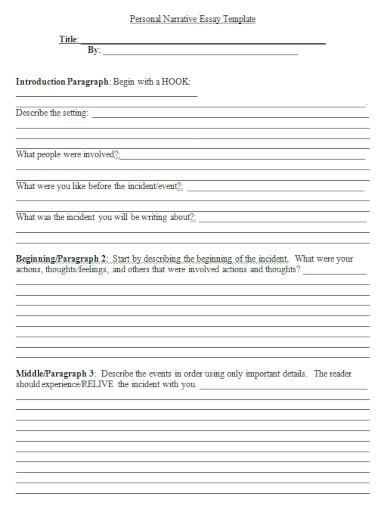
89. Draft Personal Narrative in DOC
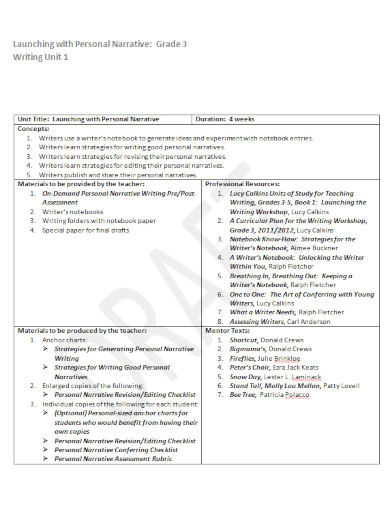
frasercurriculum.com
Size: 244 KB
90. Updated Personal Narratives
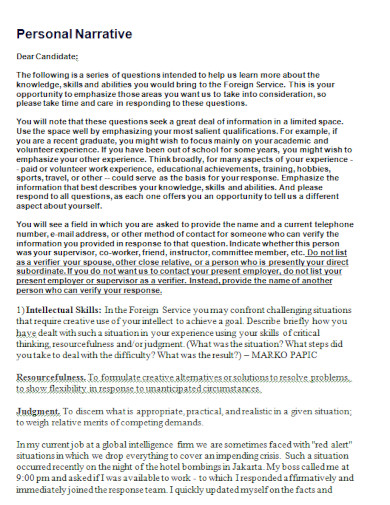
wikileaks.org
91. Assembling Personal Narrative
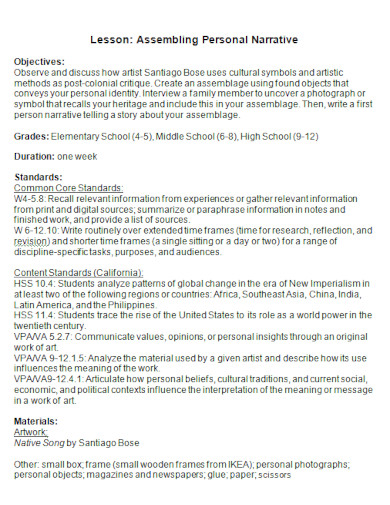
education.asianart.org
Size: 24 KB
92. Crafting a Personal Narrative
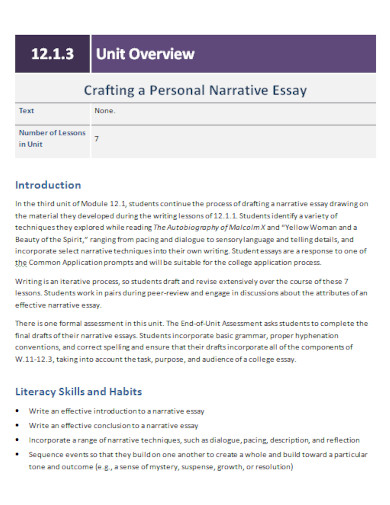
engageny.org
93. Personal Narrative Essay Assignment
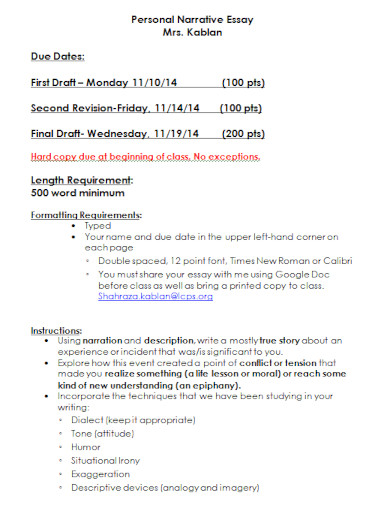
94. Personal Narrative in DOC
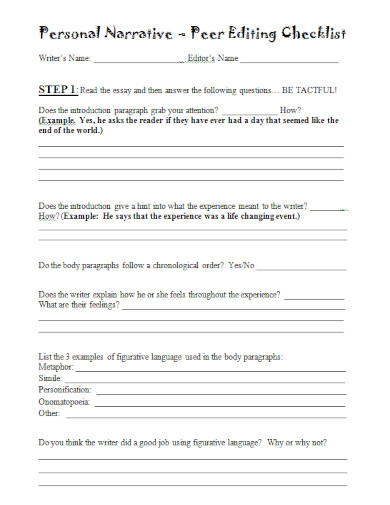
95. Personal Narrative Overview
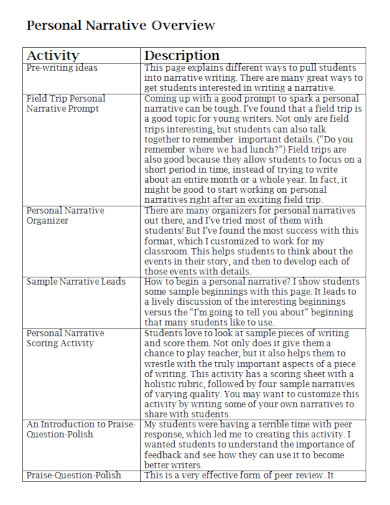
rcesfrogs.pbworks.com
96. One Page Personal Narrative
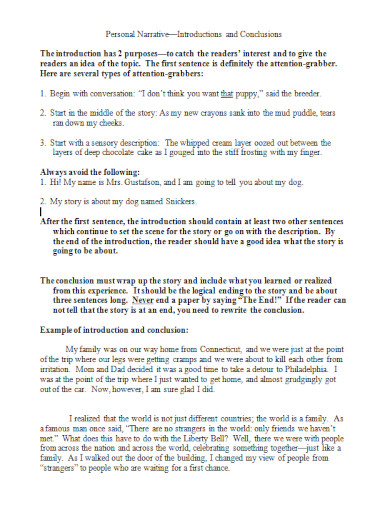
97. Personal Narrative of an Epiphany
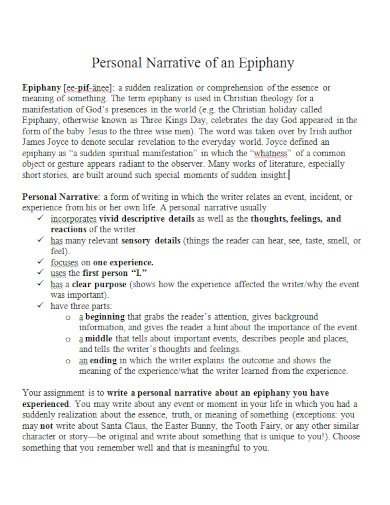
98. Simple Personal Narrative Assignment
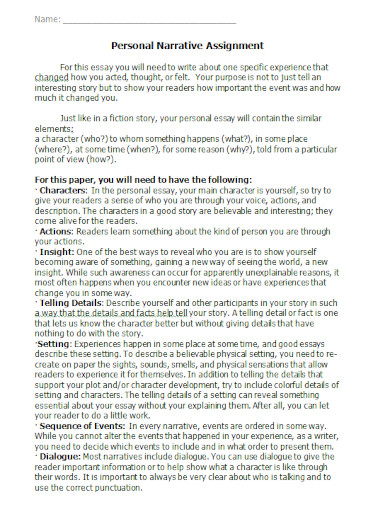
sarad.tripod.com
99. Personal Narrative Rubric in DOC
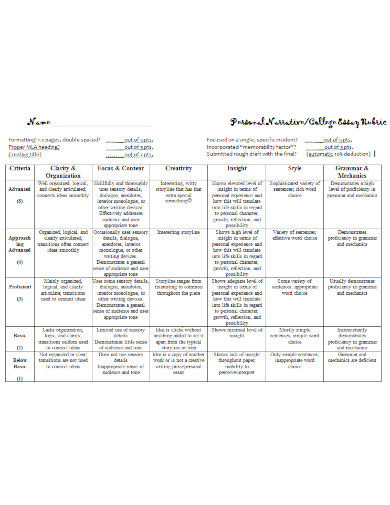
100. Reading a Personal Narrative
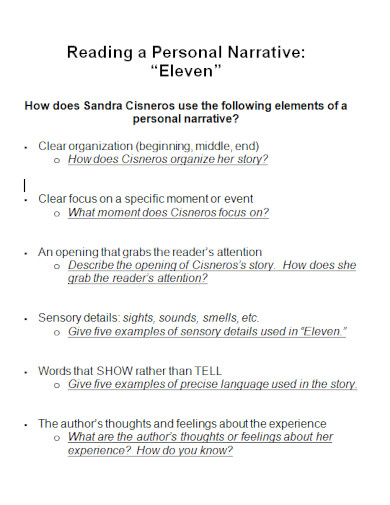
101. Personal Narrative Self and Peer Revision
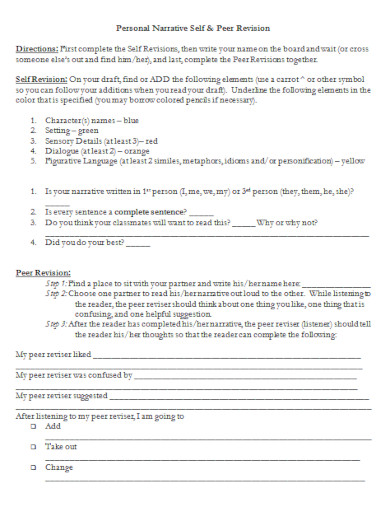
files.edl.io
Where Can I Use Personal Narrative?
Personal narratives are versatile and can be used in various contexts:
- Educational Assignments: Students often write personal narratives in English or writing classes, for college applications, or scholarship essays.
- Blogs and Social Media: Sharing your personal stories on blogs, social media platforms, or personal websites can engage and connect with your audience.
- Therapeutic Settings: Writing personal narratives can be a form of self-expression and reflection, often used in therapy or personal development exercises.
- Professional Settings: Personal narratives can be used in job interviews, professional bios, or motivational speeches to share your experiences and connect with your audience.
- Creative Writing: They are a fundamental aspect of creative writing, used in memoirs, autobiographies, or as inspiration for fictional stories.
- Public Speaking: Personal stories are often shared in public speaking contexts, like TED Talks, to make a point or connect with the audience on a personal level.
Tips to Write a Personal Narrative
- Choose a Meaningful Event: Focus on an event or experience that significantly impacted your life. This will give your narrative depth and emotion.
- Engage with Descriptive Language: Use vivid descriptions to bring your story to life. Include sensory details that allow the reader to see, hear, feel, and experience the event with you.
- Show, Don’t Tell: Demonstrate the events, emotions, and scenery through detailed descriptions and actions, rather than just summarizing them.
- Incorporate Personal Reflections: Share your thoughts and feelings about the event. This adds a layer of depth and helps the reader understand its impact on you.
- Start with a Strong Hook: Capture the reader’s interest from the beginning with an intriguing start. This could be a surprising fact, a question, or a vivid scene.
- Use Clear and Concise Language: Keep your writing straightforward and focused. Avoid unnecessary details that might distract from the main story.
What is that one thing to avoid when writing a personal narrative?
Avoid making up things as you go along. Your personal narrative is not a work of fiction. It is a work of nonfiction. Everything that you have written down must be true. From the people, location and to the story itself.
What is one advice you can give to someone who is a beginner?
Trust your instinct when you remember your story. Avoid giving too much information or too little. Always proofread your work.
How long is a personal narrative?
This may depend on the person writing it. But a personal narrative cannot be too short, since it is expected to be quite a long story.
As a personal narrative essay has its own conclusion, so does this article. From the beginning to its plot, and the end. If you plan on writing your own personal narrative, you may now have an idea on how to begin. If you still think you are a bit confused with how you start, you can always ask yourself, what experience do you wish to share to the public. Check out the tips for more as well.
Text prompt
- Instructive
- Professional
10 Examples of Public speaking
20 Examples of Gas lighting
Narrative Essay Writing
Narrative Essay Examples

20+ Top Narrative Essay Examples by Experts
12 min read
Published on: Apr 12, 2020
Last updated on: Mar 24, 2024

People also read
How to Write a Narrative Essay in Simple Steps
Interesting Narrative Essay Topics and Ideas
Personal Narrative Essay - Easy Guide & Examples
Share this article
Narrative essays are a common assignment in school, but many students struggle to write them.
The problem with narrative essays is that they can be difficult to write. They require students to think about their own experiences and to put those experiences into words. This can be a challenge, especially for students who are not used to writing about themselves.
The solution to the problem of writing narrative essays is to provide students with examples. By reading examples of narrative essays, students can see how other students have successfully written about their own experiences.
In this blog post, we will provide you with examples of narrative essays.By the end of this blog post, you will have a better understanding of how to write a narrative essay.
On This Page On This Page -->
Before writing, go through narrative essay examples to ensure that outlining and formatting are done correctly. Moreover, looking at examples will allow the writer to understand sensory details and vocabulary to describe events, settings, characters, and emotions.
Here are some famous narrative essays that you can consider adding to your reading wishlist:
âA Modest Proposalâ by Jonathan Swift
âOnce More to the Lakeâ by EB White
âThe Fourth of Julyâ by Audre Lorde
âThe Story of an Hourâ by Kate Chopin
âThe Crisisâ by Thomas Paine
But it doesn't end here! To help our students, CollegeEssay.org has gathered many other narrative essay sample. These examples will help you learn the correct formation of a narrative essay.
Read on to discover!
Personal Narrative Essay Example
Are you looking for a sample to draft a personal narrative essay ? Go through the example provided below to understand how the first-person and third-person perspectives are used in a narrative essay.
|
Sample Personal Narrative Essay
Narrative Essay Example for Middle School
A narrative essay is frequently assigned to middle school students to assess their writing and creative skills. If you are a student looking for a sample narrative essay for your middle school assignment, go through the example provided below.
Narrative Essay Example: 7th Grade
Narrative Essay Example for Grade 8
Grade 9 Narrative Essay Example
Sample Narrative Essay Grade 12
Narrative Essay Example for High School
When drafting assignments for high school, professional writing is essential. Your essays and papers should be well structured and written in order to achieve better grades. If you are assigned a narrative essay, go through the sample provided to see how an effective essay is written.
Sample Narrative Essay For High School
Good Narrative Essay Examples for College
College essays are more complex in nature than other academic levels. They require a better understanding of the concept, following a proper writing procedure, and an outline.
Although you are to draft a narrative essay for your college assignment, make sure it is professionally written. Read the sample narrative essay provided below.
|
Descriptive Narrative Essay Example
If you are to draft a document on the recreation of an event, a descriptive narrative essay is written. It presents an incident that happened to the writer and the backed-up information that supports the story.
The following is a perfect example of a descriptive narrative essay.
Sample Descriptive Narrative Essay

Paper Due? Why Suffer? That's our Job!
Literacy Narrative Essay Example
Academic assignments often require students to draft essays on education. Education is the most significant topic of discussion, and for this purpose, almost every essay type and research paper studies it.
If you are drafting a narrative essay on literacy, go through the sample provided.
Fictional Narrative Essay Example
Drafting a fictional piece of document requires a more vivid description and detail. If you are assigned a narrative essay to draft on a fictional theme, read the example provided below.
Sample Fictional Narrative Essay
The Essentials of Narrative Essays
In a narrative essay, the goal is to write a story from one person's perspective. To do this well requires incorporating all of these aspects:
Below are some golden points that you should keep in mind when writing a narrative essay.
- Chronological order is the most common way to present information.
- A thesis statement has a function in an essay. This is typically evident in the opening paragraph.
- The writer's argument is clearly communicated through the use of sensory details and vivid language.
- This draws the reader in and makes them interested in what the writer has to say. Everything in the passage is somehow related to the main point.
How to Start a Narrative Essay?
When you start writing the narrative essay, you should follow some steps and make your writing process easy.
For your help, we gathered some steps that you should follow when starting writing the essay.
- Choose a narrative essay topic that is engaging and interesting.
- Do some research and then start writing the essay.
- Create an outline.
- Start writing the essay. The way you describe things should be creative and colorful. Thus, the reader can feel as if they are right there with what's happening.
- Proofread the essay before submitting it.
Watch the video below for tips on how to write a narrative essay:
Narrative Essay Writing Tips
Professional essay writers of CollegeEssay.org have gathered some tips and tricks for you to follow to make your narrative essay remarkable. Even if you are aware of the writing procedure, it is advised to use expert tips to make your documents flawless.
Follow the tips provided below to draft an exceptional narrative essay.
- Clear Content: The narrative essay content should be clear. All the details and descriptions provided should be readable and understandable by the audience. Avoid using complex words and distribute content into paragraphs.
- Keep it concise: Avoid describing every minor detail or movement. Provide only explanations that are important for the readers to imagine.
- Use first-person perspective: To make something believable and interesting for the readers, state it from the first-person perspective. Share your personal experiences, stories, and opinions to make the content impactful.
- Use limited referencing: When drafting an essay, according to the instructed format, avoid using frequent in-text citations.
- Use Clear Stance: Write your point of view clearly, so the readers feel that it is a genuine piece of writing.
Keep in mind that a narrative essay is different from an expository essay but the same as a descriptive essay .
In conclusion,
Using the tips provided by the professionals and going through the narrative essay examples will let you draft an effective paper.
Looking for top-tier essay writing help online ?
Our narrative essay writing service offers unparalleled expertise to bring your stories to life with clarity and creativity.
Also, elevate your writing journey with the best essay writer , our AI-driven tool that combines cutting-edge technology with user-friendly functionality. Experience the blend of traditional craftsmanship and modern innovation in your next essay. Try it now!
Frequently Asked Questions
How long is a narrative paragraph.
Paragraphs vary in length depending on the content, but a standard 5-sentence paragraph usually isn't enough to tell an interesting story.
How do I write a narrative essay?
Here are some steps that will help you to write a great narrative essay.
- Consider the topic
- Start writing the draft
- Provide supporting facts
- Revise your essay
Cathy A. (Literature, Marketing)
For more than five years now, Cathy has been one of our most hardworking authors on the platform. With a Masters degree in mass communication, she knows the ins and outs of professional writing. Clients often leave her glowing reviews for being an amazing writer who takes her work very seriously.
Paper Due? Why Suffer? That’s our Job!

Keep reading

Legal & Policies
- Privacy Policy
- Cookies Policy
- Terms of Use
- Refunds & Cancellations
- Our Writers
- Success Stories
- Our Guarantees
- Affiliate Program
- Referral Program
- AI Essay Writer
Disclaimer: All client orders are completed by our team of highly qualified human writers. The essays and papers provided by us are not to be used for submission but rather as learning models only.

IMAGES
VIDEO
COMMENTS
narrative a title. The writer describes his or her feelings about the situation. The writer describes the events in the order in which they happened. The writer ends his or her story by sharing what he or she learned from this experience. The writer sets the scene and makes the reader want to read more. The writer describes a problem he or she ...
Descriptive writing examples for middle school. Descriptive Writing Samples from Novels; Milwaukee Public Schools Descriptive Essay Samples (p. 137) Holt, Rinehart, Winston Descriptive Essay Models; Narrative writing examples for middle school. Writing Samples by Steve Peha (PDF) The Write Source Narrative Writing Samples
STEP 1 Identify the main idea of the narrative. The main idea is how awkward and nerve racking the first day of school was. STEP 2 Make sure the details relate to the main idea. The scene in the office was the first sign that I would be out of step with everybody the whole day. STEP 3 Make sure that the details will help the reader create a ...
This 4th grade essay uses personal details to bring a beloved friend to life. Read the full essay: Ann at Thoughtful Learning. Middle School Personal Narrative Examples. By middle school, personal narratives are longer and more involved, telling more detailed stories and experiences.
For years, I didn't do personal narrative writing in middle school. In fact, I wrote an entire blog post about why I didn't do it. Main reason...it's been done before in many years prior to when those students came to you, especially if teachers prior use writing workshop. However, I've grown to embrace it again. The biggest reason why is because I think it helps build a classroom community. I ...
Here is a PDF of all 650 prompts, and we also have a related lesson plan, From 'Lives' to 'Modern Love': Writing Personal Essays With Help From The New York Times.. Below, a list that ...
A personal narrative essay uses the components of a story: introduction, plot, characters, setting, and conflict. It also uses the components of argument, thesis, and conclusion. In a personal narrative essay, we tell our readers a story to make a larger argument. Focusing the readers' attention on significant, detailed scenes, we develop our ...
Please select one of the Personal Narrative Writing Prompts from the menu, or select one of your own. Please remember to follow the directions, proofread for grammatical errors, and review your rubric. Your narrative essay must contain the following elements: Beginning, Middle, End Interesting Characters Purposeful Dialogue
3. Create a Thesis Statement. The thesis statement is the most important sentence and tells the reader what your essay will be about. In a personal narrative essay, the thesis statement can briefly explore the story's events. Or it can tell the reader about the moral or lesson learned through personal experience.
P.E. at our school is competitive. We play games as if our lives ... Middle End of the story Conclusion (with Message) Tool 7-2a Personal Narrative Example SSecondary-sec7.indd 12econdary-sec7.indd 12 44/12/07 10:55:55 AM/12/07 10:55:55 AM. Title: Secondary-sec7.indd Author:
Sometimes narratives are called short stories or personal narratives. Essentially, narratives are stories. What makes narrative writing so exciting for students is the opportunity to create a detailed story. Whether the story is fiction or nonfiction, the space to add imagery, details, and imagination are huge perks for more creative students.
639 words | 1 Page. Introduction Moving to a new city, especially one as dynamic and culturally rich as Shanghai, is an experience that can shape one's life in profound ways. This essay recounts my personal narrative of relocating from my hometown to Shanghai, a move that encompassed a blend…. Journey.
Here's how I like to set up personal narrative essay writing in the classroom: 1. Teach about the Genre. To begin, I like to explore the idea of personal narrative writing. While many of our middle school ELA students have written other types of essays before, this is often the first time they encounter this the personal narrative writing genre.
A narrative essay tells a story. It uses descriptive language to tell the beginning, middle, and end of an event. It has an introduction that engages the reader's interest, details about the main event or action in the story, and a conclusion that describes the outcome. Narrative Essay Organization. INTRODUCTION.
65 Engaging Personal Narrative Ideas for Kids and Teens. Tell a story to engage the reader. Personal narrative essays are all about telling stories. Engage your reader with lots of descriptive language, and ensure you have a beginning, middle, and end. (Get more tips about teaching narrative writing here.) Try these personal narrative ideas to ...
Student Models. When you need an example written by a student, check out our vast collection of free student models. Scroll through the list, or search for a mode of writing such as "explanatory" or "persuasive.".
WRITE Institute, January 2014. tituteScoring Guide for Personal NarrativeA personal narrative essay is a well-told story in a natural, honest voice about. specific occurrence in a writer's life. The writer uses vivid sensory detail to engage the reader and reveals (either impli. he significance of the event.Scor.
Playground Memory. In elementary school, I had many experiences that garnered memories. I was often bullied on the playground during recess because of my skinniness and height. The larger boys saw me as a target for their ego to inflate. They might have had problems at home, or were bullied themselves, and were projecting their frustrations on me.
7. An Act Of Kindness. Sharing an act of kindness you did with someone else—or a random act of kindness that someone did for you—can provide a warm, fuzzy topic for your narrative essay. When writing about an act of kindness, focus on how the act made you feel, whether you were the giver or the receiver of the act.
In September, we challenged teenagers to write short, powerful stories about meaningful life experiences for our first-ever personal narrative essay contest. This contest, like every new contest ...
Narrative Essay A narrative essay tells a story. It uses descriptive language to tell the beginning, middle, and end of an event. It has an introduction that engages the reader's interest, details about the main event or action in the story, and a conclusion that describes the outcome. doesn't tell the whole story (just a
Best Example of Personal Narrative. Title: "The Day I Conquered My Fear". It was a bright summer morning, the kind that promised adventures. My heart pounded as I stood at the edge of the high diving board, peering into the deep blue pool below. I was always afraid of heights, and here I was, facing my biggest fear.
Go through the example provided below to understand how the first-person and third-person perspectives are used in a narrative essay. The Day I Learned to Swim. I was 10 years old when I learned to swim. I had always been afraid of water, but my parents decided it was time for me to learn how to swim.